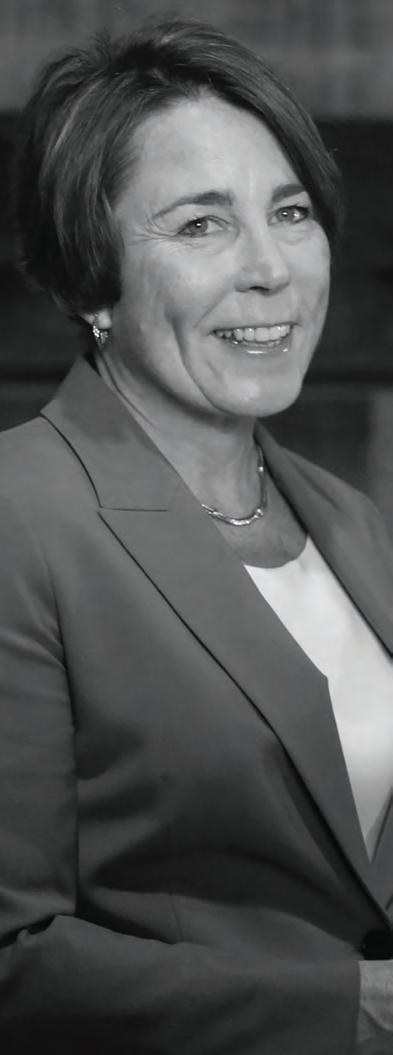

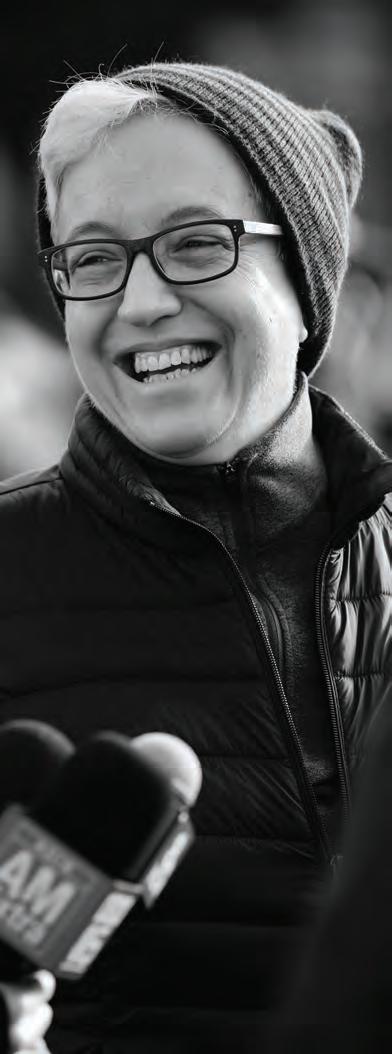
CLUB Q’S HEROES & ANGELS RIDE THE RAINBOW WAVE WITH GOV. MAURA HEALEY, REP. ROBERT GARCIA, & GOV. TINA KOTEK SALLY FIELD CHEYENNE JACKSON FREEING BRITTNEY K YRSTEN SINEMA WHIPLASH JANUARY/FEBRUARY 2023 ISSUE 1125 LGBTQ+ SINCE 1967 ADVOCATING FOR ALL OF US
IMPORTANT FACTS FOR BIKTARVY®
This is only a brief summary of important information about BIKTARVY and does not replace talking to your healthcare provider about your condition and your treatment.
MOST IMPORTANT INFORMATION ABOUT BIKTARVY
BIKTARVY may cause serious side e ects, including:
Worsening of hepatitis B (HBV) infection. Your healthcare provider will test you for HBV. If you have both HIV-1 and HBV, your HBV may suddenly get worse if you stop taking BIKTARVY. Do not stop taking BIKTARVY without first talking to your healthcare provider, as they will need to check your health regularly for several months, and may give you HBV medicine.
ABOUT BIKTARVY
BIKTARVY is a complete, 1-pill, once-a-day prescription medicine used to treat HIV-1 in adults and children who weigh at least 55 pounds. It can either be used in people who have never taken HIV-1 medicines before, or people who are replacing their current HIV-1 medicines and whose healthcare provider determines they meet certain requirements.
BIKTARVY does not cure HIV-1 or AIDS. HIV-1 is the virus that causes AIDS.
Do NOT take BIKTARVY if you also take a medicine that contains:
dofetilide rifampin
any other medicines to treat HIV-1
BEFORE TAKING BIKTARVY
Tell your healthcare provider if you:
Have or have had any kidney or liver problems, including hepatitis infection.
Have any other health problems.
Are pregnant or plan to become pregnant. It is not known if BIKTARVY can harm your unborn baby. Tell your healthcare provider if you become pregnant while taking BIKTARVY.
Are breastfeeding (nursing) or plan to breastfeed. Do not breastfeed. HIV-1 can be passed to the baby in breast milk.
Tell your healthcare provider about all the medicines you take:
Keep a list that includes all prescription and over-thecounter medicines, antacids, laxatives, vitamins, and herbal supplements, and show it to your healthcare provider and pharmacist.
BIKTARVY and other medicines may a ect each other. Ask your healthcare provider and pharmacist about medicines that interact with BIKTARVY, and ask if it is safe to take BIKTARVY with all your other medicines.
POSSIBLE SIDE EFFECTS OF BIKTARVY
BIKTARVY may cause serious side e ects, including: Those in the “Most Important Information About BIKTARVY” section.
Changes in your immune system. Your immune system may get stronger and begin to fight infections that may have been hidden in your body. Tell your healthcare provider if you have any new symptoms after you start taking BIKTARVY.
Kidney problems, including kidney failure. Your healthcare provider should do blood and urine tests to check your kidneys. If you develop new or worse kidney problems, they may tell you to stop taking BIKTARVY.
Too much lactic acid in your blood (lactic acidosis), which is a serious but rare medical emergency that can lead to death. Tell your healthcare provider right away if you get these symptoms: weakness or being more tired than usual, unusual muscle pain, being short of breath or fast breathing, stomach pain with nausea and vomiting, cold or blue hands and feet, feel dizzy or lightheaded, or a fast or abnormal heartbeat.
Severe liver problems, which in rare cases can lead to death. Tell your healthcare provider right away if you get these symptoms: skin or the white part of your eyes turns yellow, dark “tea-colored” urine, light-colored stools, loss of appetite for several days or longer, nausea, or stomach-area pain.
The most common side e ects of BIKTARVY in clinical studies were diarrhea (6%), nausea (6%), and headache (5%). These are not all the possible side e ects of BIKTARVY. Tell your healthcare provider right away if you have any new symptoms while taking BIKTARVY.
You are encouraged to report negative side effects of prescription drugs to the FDA. Visit www.FDA.gov/medwatch or call 1-800-FDA-1088.
Your healthcare provider will need to do tests to monitor your health before and during treatment with BIKTARVY.
HOW TO TAKE BIKTARVY
Take BIKTARVY 1 time each day with or without food.
GET MORE INFORMATION

This is only a brief summary of important information about BIKTARVY. Talk to your healthcare provider or pharmacist to learn more. Go to BIKTARVY.com or call 1-800-GILEAD-5
If you need help paying for your medicine, visit BIKTARVY.com for program information.
(bik-TAR-vee)
BIKTARVY, the BIKTARVY Logo, GILEAD, the GILEAD Logo, GSI, and KEEP BEING YOU are trademarks of Gilead Sciences, Inc., or its related companies. Version date: February 2021 © 2022 Gilead Sciences, Inc. All rights reserved. US-BVYC-0008 01/22














Please see Important Facts about BIKTARVY, including important warnings, on the previous page and visit BIKTARVY.com. BIKTARVY® is a complete, 1-pill, once-a-day prescription medicine used to treat HIV-1 in certain adults. BIKTARVY does not cure HIV-1 or AIDS. Ask your healthcare provider if BIKTARVY is right for you. Because HIV doesn’t change who you are. ONE SMALL PILL, ONCE A DAY Pill shown not actual size (15 mm x 8 mm) | Featured patient compensated by Gilead. #1 PRESCRIBED HIV TREATMENT * *Source: IQVIA NPA Weekly, 04/19/2019 through 05/28/2021. Scan to see Chad’s story. CHAD LIVING WITH HIV SINCE 2018 REAL BIKTARVY PATIENT KEEP BEING YOU.
FEATURES
8 Legendary Lunch
The stars (and our staff) came out to celebrate queer joy at The Advocate's People of the Year luncheon.
12 Out on the Town Out100 honorees and their loved ones partied the night away in NYC.


26 Legacy of Love
As she steps down from her post as Speaker of the House, we reflect on Nancy Pelosi's years of HIV advocacy.
36
Free at Last
After 10 months of hell, Brittney Griner has been released from Russian imprisonment and is back home in the U.S. with her wife.
54 Healing After Horror
As a community, how do we move on after tragedies like the Club Q shooting?
55 Generation Hope
A new book for kids teaches lessons of diversity and love.
Hollywood Hubby Star of stage and screen Cheyenne Jackson opens up about balancing the joys of fatherhood, a happy marriage, and his successful career.
46
ABOVE: Cheyenne Jackson photographed by Maxwell Poth
UP FRONT
14 The Laws of Love Biden takes action to protect marriage equality.
16 One Brave Soul Meet the loving father who took down the Club Q shooter.
18 Gone Too Soon Remembering the beautiful souls who lost their lives at the Club Q tragedy.
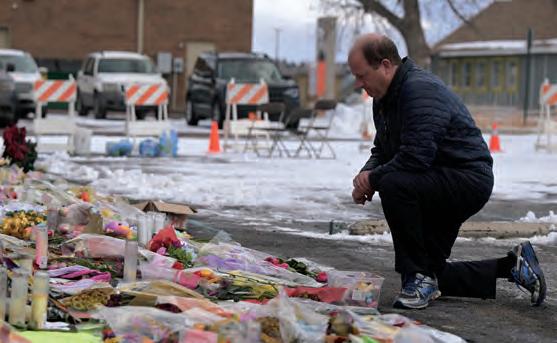
20 Black, Femme, Fab This organization celebrates Black trans talent.
22 With Honors These two soldiers helped usher in a new era of respect for trans vets.
22 The Battle Continues The numbers on trans service members may surprise you.
23 See Ya, Sinema
The controversial bisexual senator bids adieu to the Democratic party.
AROUND THE WORLD
PASSAGES
30 Saying Goodbye
Queer community members whose impact lives on.
SEX & HEALTH
32 Let’s Get Physical “Butt doctor” Carlton Thomas’s advice on making the most of your annual physical.
34 Fauci’s Farewell Upon his retirement, the good doctor reflects on his amazing career.
ENTERTAINMENT
56 Maternal Instincts
Legend and queer icon Sally Field on her latest role as a supportive mom of a gay son.
60 The Way We Really Were An iconic Hollywood classic’s surprising queer backstory.
61 Lost in Translation Did the bible ever truly condemn homosexuality?
62 Melody Makers

Keep your eyes (and ears) on these seven LGBTQ+ artists.


#SEEHER
POLITICS/COVER
28 Can’t Stop Us Now
Hundreds of LGBTQ+ politicians, including two lesbian governors, made history in 2022
64 Bare Beauty
One woman is defying beauty norms in the pageant world.
24 A Brave New (Queer) World The status of LGBTQ+ equality around the globe. 56
JANUARY / FEBRUARY 2023 T HE ADVOCATE 3 HYOUNG CHANG/GETTY IMAGES (18); CHESTER CANASA (20); HULTON ARCHIVE/GETTY IMAGES (56); DANIN JACQUAY (62) 18
20
62


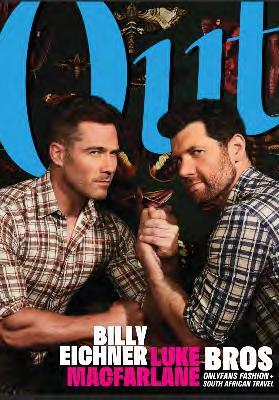





chief executive officer Mark Berryhill chairman , global growth & development Michael
chief financial officer Joe Lovejoy chief marketing officer Michel J. Pelletier
editorial director Neal Broverman
editorial executive editor Desirée Guerrero digital director Alex Cooper senior politics editor Trudy Ring managing editor JD Glass associate editors Jacob Anderson-Minshall, Donald Padgett, Rachel Shatto editor at large John Casey contributing editors Cara Glass, Michael Kelley
senior national reporter Christopher Wiggins staff writers Mey Rude, Ryan Adamczeski
art executive creative director Raine Bascos graphic designer Mariusz Walus digital photo editor Nicole Arseneault senior marketing designer Erik Brock print production production director John Lewis equalpride editorial editorial director Neal Broverman out, editor in chief Daniel Reynolds out, digital director Raffy Ermac out & pride com , associate digital director Bernardo Sim out traveler , editor in chief Jacob Anderson-Minshall plus , editor in chief Desirée Guerrero pride . com , editor in chief Rachel Shatto editorial programs manager Dustina Haase-Lanier
advocate channel vp , video , operations Jason Knight vp , women ’ s programming & host Sonia Baghdady
vp , entertainment, editorial director & host Tracy E. Gilchrist senior producer Brian Kelley chief booker & producer Ricky Cornish editorial director & producer Cara Glass
host & producer Jaymes Vaughan host & producer Stephen Walker host & producer Rachel Smith climate change reporter & producer Michael Smith producer Jasmine Hardy
The Advocate is published bimonthly by equalpride. The Advocate is a registered trademark of equalpride. Entire contents ©2023 by equalpride. All rights reserved. The Advocate is distributed to newsstands by Comag Marketing Group Printed in the USA .
chief video editor Lamont Baldwin senior video editor Brian Pavone senior video editor Richard Gacovino graphic artist Don Michael, Jr.
brand partnerships and sales evp , brand partnerships & integrated sales Stuart Brockington vp & publisher , out Mark Isom
advertising , brand partnerships & integrated sales vp , strategy & brand partnerships Christopher Go vp , sales Joe Valentino vp , activations & brand partnerships
Tim Snow
creative director , brand partnerships Michael Lombardo director , integrated sales Kaylyn Blackmore manager , brand partnerships Anna Carias
brand partnerships specialist Erin Manley coordinator , brand partnerships Jose Cardenas account coordinator , sales & advertising administration Carina Buie, Julean DeJesus account executive , sales Henry Krajewski
advertising ad operations Stewart Nacht manager , ad operations Tiffany Kesden digital vp , technology & development Eric Bui manager , social media Christine Linnell specialist, social media Jade Delgado circulation and finance director , circulation Argus Galindo controller , accounts manager Paulette Kadimyan manager , accounts receivable Lorelie Yu operations director of people and culture Dru Forbes director of audience and development Bernard Rook pr specialist Marie-Adélina de la Ferrière executive assistant Lulu Dropo
los angeles advertising phone (310) 806-4288 fax (310) 806-4268 advertising email adinfo@advocate.com editorial email editor@advocate.com new york advertising phone (212) 242-8100 fax (212) 242-8338
subscriber services
For new subscriptions, renewals, payments, and address changes, go to advocate.com/services. To contact us, go to advocate.com/subcontact or write to: Customer Service, equalpride, P.O. Box 8419, Lowell, MA 01853
A NOTE FROM OUR CEO
Hi there! As CEO of equalpride, the publisher of The Advocate, Out, Out Traveler, and Plus magazines, and producer of the Advocate Channel, I wanted to acknowledge the whirlwind our community has experienced over the past few months. We’ve had dramatic highs, like the election of hundreds of LGBTQ+ politicians and the freeing of Brittney Griner — all covered in this issue of The Advocate. We’ve also had horrific lows, like the massacre at Club Q in Colorado Springs.
Not long after that tragedy, Michael Kelley, equalpride’s chairman (above right), and I were lucky enough to be in Washington, D.C. to commiserate over and celebrate 2022, when we witnessed President Biden signing the Respect for Marriage Act, a monumental law that will protect us from right-wing incursions on our relationships.

It’s been a dramatic and thrilling year for our company as well, as it thankfully returned to LGBTQ+ ownership. Following COVID’s peak, we have also been able to once again host live events — as you’ll see here, with November’s glamorous Out100 celebration in New York and the joyous luncheon for The Advocate’s People of the Year honorees held in December in Los Angeles.

Thank you for being a loyal reader of our publications and websites as we continue to cover our community’s march to equality. I welcome feedback and ideas, so please feel free to reach out at advocatemarkb@equalpride.com, IG @advocatemarkb.
Warmest Regards, Mark Berryhill, Chief Executive Officer

5 T HE ADVOCATE JANUARY/FEBRUARY 2023 TWITTER.COM/THEADVOCATEMAG FACEBOOK.COM/THEADVOCATE INSTAGRAM.COM/THEADVOCATEMAG
Kelley
COURTESY MARK BERRYHILL
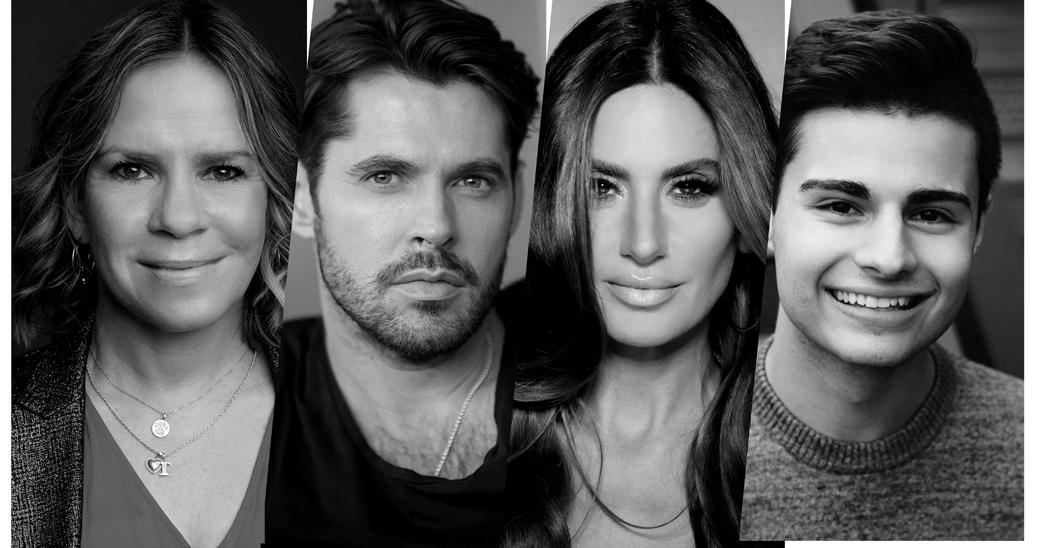





I WAS IN COLORADO when a gunman opened fire in the Club Q nightclub in Colorado Springs. I was with my family north of Denver for an upcoming Thanksgiving dinner at my mother-in-law’s house, about 100 miles north of the carnage. Between editing and posting stories the day that followed the shooting, my family and I headed to Denver to visit friends at an outdoor holiday market. It was surreal watching people giggle over hot chocolate just hours after another mass shooting had riven Colorado, home to Columbine, Aurora, and so many other unnecessary scenes of domestic terrorism. For many of the people at that wholesome Christmas gathering, Club Q felt far away, literally and figuratively; I thought how many of the straight and cisgender people there don’t have to endure that pang of anxiety when they hold their partner’s hand or when they walk down the street in the clothes that feel right for them, or when they go into an establishment that’s supposed to be a respite from judgment and hostility.
That whole week I never cried. The days that followed the Club Q attack were packed personally and professionally; but that’s not why I didn’t shed tears. Weeks later, as I edited a piece for this issue on the five beautiful people killed in that nightclub (page 18) I finally found myself heaving uncontrollably, grabbing a tissue before saline drenched my laptop. It wasn’t my hectic schedule that had prevented my sobs; it was the
survival mechanism that I, and almost all queer and marginalized people, have developed. A strength, an endurance that forces us to soldier on as another person came for us in the most violent of ways. It’s the same power that pushed us on after Donald Trump banned trans people from the military, when Anita Bryant tried to get us fired from our jobs, and now, when Gov. Ron DeSantis says we’re groomers. It was that resilience that got us through the AIDS crisis and mpox and COVID.
My fierce grandmother was the one who first developed my appreciation for fortitude. LGBTQ+ people have always loved and admired survivors like my grandma, but I don’t think we actually give ourselves enough credit. The women of the Black Trans Femme Arts Collective (page 20) epitomize that tenacity I love; they are changing the tragic trans narrative that the media often falls back on (when they’re not denigrating and dehumanizing trans people).
In fact, this issue is filled with other brave individuals soldiering on, from Nancy Pelosi (page 26) to Cheyenne Jackson (page 46) to Sally Field (page 56) to Brittney Griner (page 36) to Club Q hero Richard M. Fierro (page 16). I’m so proud of these brothers, sisters, and allies — just as I’m so proud of the people that put together this magazine and its website, advocate.com. Our creative director Raine Bascos, graphic designer Mariusz Walus, executive editor Desirée Guerrero, digital director Alex Cooper, senior political editor Trudy Ring, and staff writer Christopher Wiggins pour blood, sweat, and (choked up) tears into fulfilling The Advocate ’s 56-year mission to report and uplift our community. All of us love you, our dear LGBTQ+ readers, and derive so much strength from yours. Thank you for not only supporting us, but living every day with joy and verve. Here’s to a brighter 2023.
All the best,
Neal Broverman

JANUARY /FEBRUARY 2023 T HE ADVOCATE 7
LUKE FONTANA
The Advocate celebrates some of the best, brightest, and bravest in our community at its 2022 People of the Year luncheon.
PHOTOGRAPHY BY LULU DROPO
At the end of every year, The Advocate chooses a group of individuals who represent the best of us; people who epitomize determination, fortitude, and giving back. Featured in our November/December issue, our People of the Year for 2022 included our cover stars — White House press secretary Karine Jean-Pierre and What We Do in the Shadow ’s Harvey Guillen — along with folks like children’s book author Maia Kobabe, Ukrainian president Volodymyr Zelensky, and Beyoncé.
Included in that list and in attendance at The Advocate ’s People of the Year luncheon — held at the Ace Hotel in downtown Los Angeles — were lesbian actresses Amanda Bearse and Dot-Marie Jones. Both women have inspired many with their bravery and both appeared in the history-making Bros film this year. RuPaul’s Drag Race star Mrs. Kasha Davis was also in attendance, representing another of our categories for our People of the Year — drag queens bravely facing the angry right-wing to read stories of acceptance to children. Finally, legendary ball scene figure and influential dance music artist Kevin Aviance received a Champions of Change Hall of Fame Award at the event and was honored for his 20+ years of contributions to queer culture. To the delight of all in attendance, Aviance capped off the afternoon with a fierce performance.


The Advocate ’s People of the Year luncheon was sponsored by Instagram and featured products from Cadence, a lifestyle brand dedicated to offering reusable packaging for all. The company donated 100 percent of its partnership with The Advocate to the Trans Women of Color Collective, dedicated to uplifting, supporting, and highlighting the experiences and work of trans and nonbinary women of color.

TOP TO BOTTOM
Mrs.
Kasha Davis
From left: Gerald Garth, actress Delilah Ali Rajah, and model Dexter Mayfield
continued on page 11 8 T HE ADVOCATE JANUARY / FEBRUARY 2023
Equalpride executives (from left) Joe Lovejoy, Michel Pelletier, and Mark Berryhill
DOVATO is different: unlike other HIV treatments that contain 3 or 4 medicines, DOVATO contains just 2 medicines in 1 pill.
DOVATO is a complete prescription regimen for adults new to HIV-1 treatment or replacing their current HIV-1 regimen when their doctor determines they meet certain requirements. Learn more at DOVATO.com
Important Facts About DOVATO
This is only a brief summary of important information about DOVATO and does not replace talking to your healthcare provider about your condition and treatment.
What is the most important information I should know about DOVATO?
If you have both human immunodeficiency virus-1 (HIV-1) infection and Hepatitis B virus (HBV) infection, DOVATO can cause serious side effects, including:
• Resistant HBV. Your healthcare provider will test you for HBV infection before you start treatment with DOVATO. If you have HIV-1 and hepatitis B, the HBV can change (mutate) during your treatment with DOVATO and become harder to treat (resistant). It is not known if DOVATO is safe and effective in people who have HIV-1 and HBV infection.
• Worsening of HBV infection. If you have HBV infection and take DOVATO, your HBV may get worse (flare-up) if you stop taking DOVATO. A “flare-up” is when your HBV infection suddenly returns in a worse way than before.

Results may vary.
*Undetectable means reducing the HIV in your blood to very low levels (less than 50 copies per mL).
†Compared to a tenofovir alafenamide–based 3- or 4-drug regimen.
° Do not stop DOVATO without first talking to your healthcare provider.
° If you stop taking DOVATO, your healthcare provider will need to check your health often and do blood tests regularly for several months to check your liver function and monitor your HBV infection. It may be necessary to give you a medicine to treat hepatitis B. Tell your healthcare provider about any new or unusual symptoms you may have after you stop taking DOVATO.
For more information about side effects, see “What are possible side effects of DOVATO?”

What is DOVATO?
DOVATO is a prescription medicine that is used without other HIV-1 medicines to treat human immunodeficiency virus-1 (HIV-1) infection in adults: who have not received HIV-1 medicines in the past, or to replace their current HIV-1 medicines when their healthcare provider determines that they meet certain requirements. HIV-1 is the virus that causes Acquired Immune Deficiency Syndrome (AIDS). It is not known if DOVATO is safe and effective in children.
Please see additional Important Facts About DOVATO on the following page. Ask
° Do not run out of DOVATO. Refill your prescription or talk to your healthcare provider before your DOVATO is all gone.

staying undetectable
fewer medicines
1 pill.
your doctor about
with
in
Armando Foodie Switched to DOVATO Compensated by ViiV Healthcare
No other complete HIV pill uses fewer medicines to help keep you undetectable.† Want to stay undetectable* with fewer medicines?
Important Facts About DOVATO (cont’d)
Who should not take DOVATO?
Do not take DOVATO if you:
• have ever had an allergic reaction to a medicine that contains dolutegravir or lamivudine.
• take dofetilide. Taking DOVATO and dofetilide can cause side effects that may be serious or life-threatening.
What should I tell my healthcare provider before using DOVATO?
Tell your healthcare provider about all of your medical conditions, including if you:
• have or have had liver problems, including hepatitis B or C infection.
• have kidney problems.
• are pregnant or plan to become pregnant. One of the medicines in DOVATO (dolutegravir) may harm your unborn baby.
° Your healthcare provider may prescribe a different medicine than DOVATO if you are planning to become pregnant or if pregnancy is confirmed during the first 12 weeks of pregnancy.
° If you can become pregnant, your healthcare provider may perform a pregnancy test before you start treatment with DOVATO.
° If you can become pregnant, you and your healthcare provider should talk about the use of effective birth control (contraception) during treatment with DOVATO.
° Tell your healthcare provider right away if you are planning to become pregnant, you become pregnant, or think you may be pregnant during treatment with DOVATO.
• are breastfeeding or plan to breastfeed. Do not breastfeed if you take DOVATO.
° You should not breastfeed if you have HIV-1 because of the risk of passing HIV-1 to your baby.
° DOVATO passes to your baby in your breast milk.
° Talk with your healthcare provider about the best way to feed your baby. Tell your healthcare provider about all the medicines you take, including prescription and over-the-counter medicines, vitamins, and herbal supplements.
Some medicines interact with DOVATO. Keep a list of your medicines and show it to your healthcare provider and pharmacist when you get a new medicine.
• You can ask your healthcare provider or pharmacist for a list of medicines that interact with DOVATO.
• Do not start taking a new medicine without telling your healthcare provider. Your healthcare provider can tell you if it is safe to take DOVATO with other medicines.
What are possible side effects of DOVATO?
DOVATO can cause serious side effects, including:
• See “What is the most important information I should know about DOVATO?”


What are possible side effects of DOVATO? (cont’d)
• Allergic reactions. Call your healthcare provider right away if you develop a rash with DOVATO. Stop taking DOVATO and get medical help right away if you develop a rash with any of the following signs or symptoms: fever; generally ill feeling; tiredness; muscle or joint aches; blisters or sores in mouth; blisters or peeling of the skin; redness or swelling of the eyes; swelling of the mouth, face, lips, or tongue; problems breathing.
• Liver problems.People with a history of hepatitis B or C virus may have an increased risk of developing new or worsening changes in certain liver tests during treatment with DOVATO. Liver problems, including liver failure, have also happened in people without a history of liver disease or other risk factors. Your healthcare provider may do blood tests to check your liver. Tell your healthcare provider right away if you get any of the following signs or symptoms of liver problems: your skin or the white part of your eyes turns yellow (jaundice); dark or “tea-colored” urine; light-colored stools (bowel movements); nausea or vomiting; loss of appetite; and/or pain, aching, or tenderness on the right side of your stomach area.
• Too much lactic acid in your blood (lactic acidosis).Too much lactic acid is a serious medical emergency that can lead to death.Tell your healthcare provider right away if you get any of the following symptoms that could be signs of lactic acidosis: feel very weak or tired; unusual (not normal) muscle pain; trouble breathing; stomach pain with nausea and vomiting; feel cold, especially in your arms and legs; feel dizzy or lightheaded; and/or a fast or irregular heartbeat.
• Lactic acidosis can also lead to severe liver problems, which can lead to death. Your liver may become large (hepatomegaly) and you may develop fat in your liver (steatosis). Tell your healthcare provider right away if you get any of the signs or symptoms of liver problems which are listed above under “Liver problems.”
• You may be more likely to get lactic acidosis or severe liver problems if you are female or very overweight (obese).
• Changes in your immune system (Immune Reconstitution Syndrome) can happen when you start taking HIV-1 medicines. Your immune system may get stronger and begin to fight infections that have been hidden in your body for a long time. Tell your healthcare provider right away if you start having new symptoms after you start taking DOVATO.
• The most common side effects of DOVATO include: headache; nausea; diarrhea; trouble sleeping; tiredness; and anxiety.
These are not all the possible side effects of DOVATO. Call your doctor for medical advice about side effects.
You are encouraged to report negative side effects of prescription drugs to the FDA. Visit www.fda.gov/medwatch, or call 1-800-FDA-1088.
Where can I find more information?
• Talk to your healthcare provider or pharmacist.
• Go to DOVATO.com or call 1-877-844-8872, where you can also get FDA-approved labeling.
Trademarks are owned by or licensed to the ViiV Healthcare group of companies.
October 2022 DVT:7PIL
©2022 ViiV Healthcare or licensor.
DLLADVT220018 November 2022 Produced in USA.
DOVATO.com
LEFT
Ballroom legend Kevin Aviance treats guests to an amazing live performance
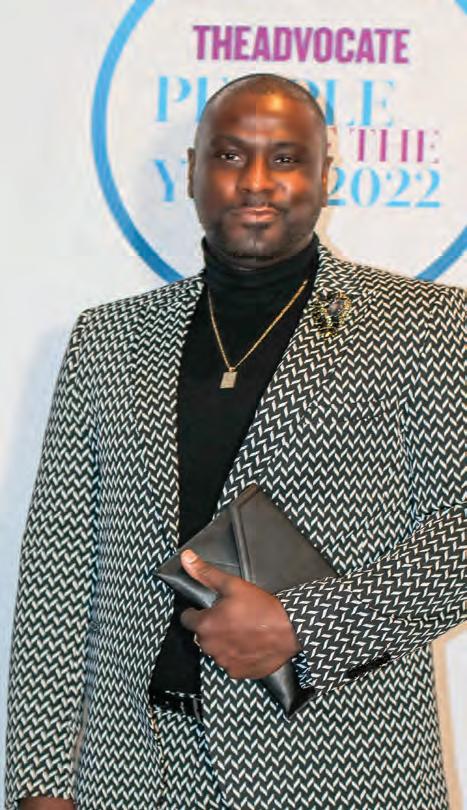

RIGHT
Pioneering lesbian actresses Dot-Marie Jones and Amanda Bearse were all smiles at The Advocate’s 2022 People of the Year luncheon

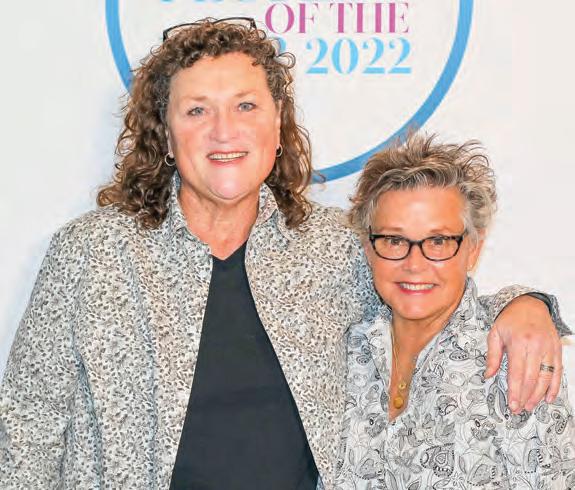
BELOW
Editorial Director Neal Broverman (bottom right) and equalpride CEO Mark Berryhill (far right) pose with some of the People of the Year
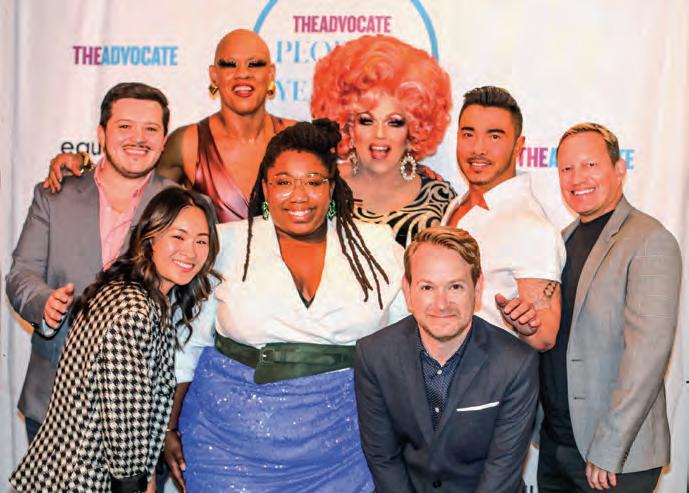
LEFT Gerald Garth of the Los Angeles LGBT Center
RIGHT Davis was honored for her contributions to the community
JANUARY / FEBRUARY 2023 T HE ADVOCATE 11
continued from page 8
OUT & ABOUT
We partied the night away in NYC to honor 2022’s Out100.
PHOTOGRAPHY BY YEKA GYADU
The glitterati gathered at New York’s Nebula nightclub this past November to celebrate the 2022 Out100 — Out magazine’s oldest and grandest tradition compiling the year’s most impactful and influential LGBTQ+ people. Out (The Advocate ’s sister publication from equalpride) utilizes the Out100 to showcase the artists, creatives, policymakers, gamechangers, and heroes making the world a better place. And to celebrate, many honorees and friends attended the annual event. One of the evening’s most stunningly dressed honorees was queer poet Aurielle Marie, who arrived in a gown gifted to her for the event by Grammy-winning bisexual singer Lizzo (which the star wore at the 2019 American Music Awards)! Other Out100 honorees who made an appearance included trans Jeopardy! champ Amy Schneider; dancer, body-positive influencer, model, and host of CBS’s Come Dance With Me, Dexter Mayfield; and the Old Gays, four TikTok stars bringing visibility to queer seniors. We’re thrilled to share some of the best moments captured at these events.

12 T HE ADVOCATE JANUARY / FEBRUARY 2023
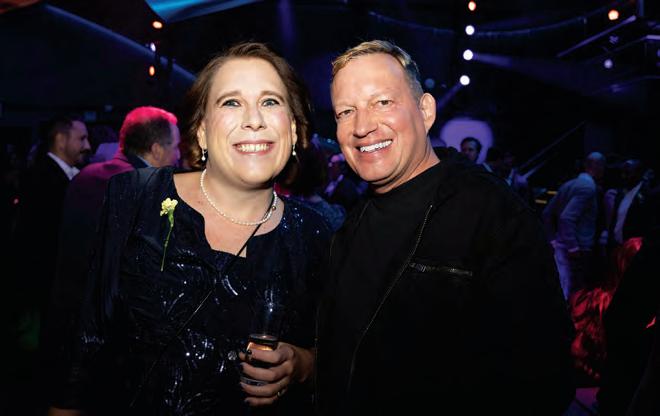

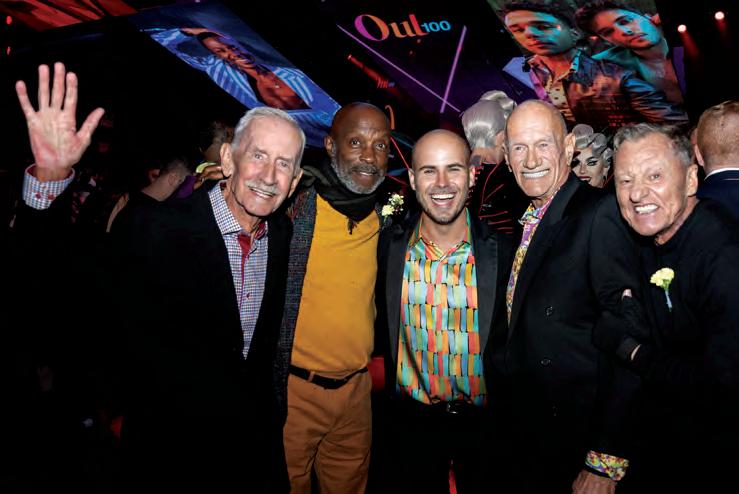
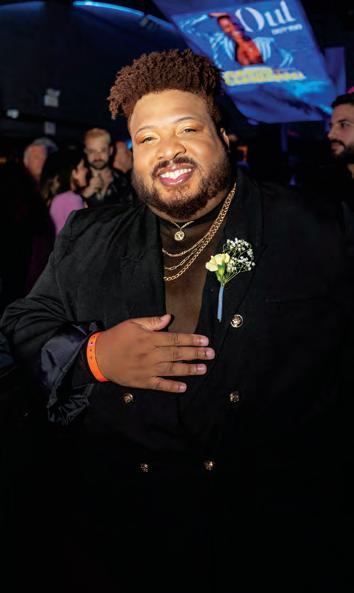
 CLOCKWISE FROM TOP Scream 6 and Yellowjackets star Jasmin Savoy Brown; Jeopardy! champ Amy Schneider with equalpride CEO Mark Berryhill; the legendary Old Gays surround their manager; dancer, activist, model, and TV star Dexter Mayfield; the festive scene at Manhattan’s Nebula
CLOCKWISE FROM TOP Scream 6 and Yellowjackets star Jasmin Savoy Brown; Jeopardy! champ Amy Schneider with equalpride CEO Mark Berryhill; the legendary Old Gays surround their manager; dancer, activist, model, and TV star Dexter Mayfield; the festive scene at Manhattan’s Nebula
WEDDING DAY
It looked like Pride in December as the president signed a bill fending off right-wing efforts to overturn marriage equality.
BY TRUDY RING

“TODAY’S A GOOD DAY,” Biden said as he stepped before the audience outside the White House. He recalled when he first came out for marriage equality 10 years ago, when he was vice president. “I want to thank all of you for being here today,” he told those in attendance, citing Vice President Kamala Harris, First Lady Jill Biden, Second Gentleman Doug Emhoff, and Transportation Secretary Pete Buttigieg.
Biden praised those who pushed through the legislation, including Sens. Tammy Baldwin, Susan Collins, Chuck Schumer, Dianne Feinstein, and others, and out U.S. Reps. David Cicilline and Sharice Davids as well as allies like U.S. Rep. Jerrold Nadler and especially outgoing House Speaker Nancy Pelosi.
The president said he was thinking of Richard and Mildred Loving, whose case won the right to interracial marriage in all states at the Supreme Court in 1967. He also noted all the couples and individuals who fought for the right to same-sex marriage, such as the late Edie Windsor, who fought the Defense of Marriage Act, which denied federal recognition to her marriage to Thea Spyer. “Today we celebrate our progress,” he said.
Biden condemned anti-LGBTQ+ legislation that is being introduced and passed in states around the nation and Justice Clarence Thomas’s stated desire for the Supreme Court to reverse its marriage equality ruling. He noted that racism, homophobia, transphobia, and anti-Semitism are all connected.
He went on to celebrate the fact that out WNBA superstar Brittney Griner has been freed from a Russian prison (see page 36) and said he got to know her wife, Cherelle Griner, while working for Brittney’s release.
Then he signed the bill into law to cheers throughout the audience. As he stepped up from the desk he signed the legislation on, Lady Gaga’s “Born This Way” played.
The Respect for Marriage Act will assure that the federal government recognizes same-sex and interracial marriages and that all states recognize those performed in other states. It forbids anyone acting under a state law to discriminate based on the gender or race of a married couple. It repeals the Defense of Marriage Act, which has been unenforceable since the Supreme Court rulings in Windsor v. U.S. (2013) and Obergefell v. Hodges (2015) but remained on the books. DOMA, passed by Congress in 1996, banned federal recognition of same-sex marriages and allowed states to deny recognition to those performed in other states.
The impetus for the legislation came after Supreme Court Justice Thomas said the court should overturn Obergefell v. Hodges, the ruling that established marriage equality nationwide. The statement came in his concurring opinion in Dobbs v. Jackson Women’s Health Organization, which struck down Roe v. Wade, the 1973 decision that legalized abortion in all states. There is no case currently making its way through the courts challenging Obergefell, but Thomas and other conservatives have made clear they would welcome one.
“This is a big day for me, but not just me,” White House Press Secretary Karine Jean-Pierre said during a briefing. Jean-Pierre is the first out queer person to serve as press secretary. “I think I speak for many of us at the White House today that we could not be prouder to be working for this administration, to be working for this particular president, and to be working on all the issues that are going to change Americans’ lives, as we have seen historic legislation over the last 22 months.”
14 T HE ADVOCATE JANUARY / FEBRUARY 2023
President Joe Biden signs the Respect for Marriage Act on the South Lawn of the White House on December 13, 2022 in Washington, DC. The Respect for Marriage Act codifies same-sex and interracial marriages

MARRIAGE UP FRONT JANUARY / FEBRUARY 2023 T HE ADVOCATE 15
GETTY
DREW ANGERER/
/IMAGES ES
FOR THE LOVE OF FAMILY
M. Fierro, the man who slammed the gunman to the ground during the Club Q shooting, talks about the aftermath of the tragedy and how we can move forward.
BY ALEX COOPER
Richard M. Fierro says he’s not a hero. In interviews, he says his actions on November 19, 2022, at the Club Q queer nightclub in Colorado Springs, Colo., were just to protect his family. But not many people would grab a gunman by the back of their body armor and pull them down to the ground, then take their gun and pistol whip them with it, ending an assault in minutes.
Along with the help of a few other patrons, the army veteran, who served tours in Iraq and Afghanistan, held the suspect, Anderson Lee Aldrich, down while police arrived.
Fierro and his wife, Jessica, and daughter, Kassandra, were not only witnesses to the attack — his daughter’s boyfriend, Raymond Green Vance, was one of the five people killed. Now Fierro is processing the violence that’s forever changed him, his family, and his community.
“We’re still grieving,” Fierro says, adding that his bruises from the confrontation are healed. “But it’s a process. I don’t know how to put it.”

Fierro’s daughter is also recovering from a broken knee she injured during the attack, he says. And she’s having to face the death of her boyfriend of six years.
“Raymond was part of our family,” Fierro says. Vance was 22, the same age as the suspected gunman. “Raymond was a good man; he earned my trust with my daughter, and I respect him for all of that. He had a lot of potential that was lost.”
Some of the families of those killed at the nightclub have stopped by his family’s brewery, Atrevida Beer Co., since the shooting. There’s been a general outpouring of support for the business, with Atrevida selling out its merchandise and beers. Fierro says he’s grateful for the response, adding that orders are backlogged while he and his family recover.
“I’m not a T-shirt guy; I’m a beer guy,” he says with a laugh. “It’s an amazing amount of love and we are completely overwhelmed.”
On the night of the shooting, the Fierros had gone to see a friend of his daughter perform. They made their way to the dance floor when the gunfire began. In interviews with media outlets, Fierro
refers back to his training from the military kicking in when he needed it the most. In arrest photos of Aldrich, his face is purple from bruises sustained when Fierro and others took him down.
Fierro says in the time since the shooting people have come up to him telling him that his actions that night inspired them. He says to get past what happened at Club Q, we could learn lessons from 9/11 about fears of returning to regular routines.
“Everybody was like, ‘Don’t let them keep you in the house. Don’t let them change your lifestyle.’ We’ve got to do the same thing with this,” he explains. Fierro says that we can’t demand Club Q have armed guards or for his own brewery to have security.
While he doesn’t know what will become of the Club Q venue, he says the space is vital. “It’s not just important for [the] LGBT community around here. It’s important for all of us.” And though the community needs to heal, Fierro says they also need not be afraid of going out again.
Fierro condemns the groups that continue to target LGBTQ+ events, including drag shows.
“These hate groups are ridiculous,” he says. Fierro suspects the hatred of these groups comes from the fear of losing majority status over historically marginalized communities.
“We have always been the ones that were the only person that looked like us in a room. And suddenly that’s starting to reverse itself and those people don’t feel like that should be the case, and I think that’s wrong. So that is their sickness,” Fierro says. “They have to get over it… that anger is disgusting…. It’s horrible.”
It’s also unjustified.
“You know, we don’t have to agree on everything. That’s fine. You can have your opinion — but your opinion does not determine whether I can be safe or not.”
And to combat this hatred and violence? Fierro says his only idea is love.
“I think that the biggest way to address it is to be nice to each other and hopefully the person that needed that hug or that acknowledgement will not do something as stupid as this.”
UP FRONT CLUB Q 16 T HE ADVOCATE JANUARY / FEBRUARY 2023 HELEN H. RICHARDSON/GETTY IMAGES
Richard
Fierro (far right) used his military experience to subdue the gunman at the Club Q nightclub

CLUB Q UP FRONT JANUARY / FEBRUARY 2023 T HE ADVOCATE 17
TAKEN FROM US
Remembering the five people killed in the attack on Club Q.

UP FRONT CLUB Q 18 T HE ADVOCATE JANUARY / FEBRUARY 2023
HELEN H. RICHARDSON/GETTY IMAGES
Gov. Jared Polis pays his respects at the memorial for the victims of the Club Q shooting in Colorado Springs, Colo.
ASHLEY PAUGH
Ashely Paugh was a mother.
In a statement her family said that her daughter Ryleigh “was her whole world,” CNN reports.
“She loved her dad, her sister, and her family; Ashley was a loving aunt, with many nieces and nephews who are devastated by her loss,” her family said.
Paugh worked for a local nonprofit called Kids Crossing which helps connect foster children to homes — that included helping LGBTQ+ children find accepting foster placements.
“She would do anything for the kids — traveling all over southeastern Colorado, from Pueblo and Colorado Springs to Fremont County and the Colorado border, working to raise awareness and encourage individuals and families to become foster parents to children in our community,” the statement said.
RAYMOND GREEN VANCE
Raymond Green Vance, 22, died while visiting Club Q with his girlfriend, her parents, and some of her parents’ friends.



According to a statement by his family, they had gone to celebrate a birthday. He was with the man, Richard M. Fierro, who tackled and subdued the suspected gunman.
Vance had started a new job and was excited about getting his first check. At the time of his death, he lived with his mother and brother.
“Unfortunately, he never left the club. Raymond was the victim of a man who unleashed terror on innocent people out with family and friends,” Vance’s family said. “His own family and friends are completely devastated by the sudden loss of a son, grandson, brother, nephew, and cousin loved by so many.”
They added, “Raymond was a kind, selfless young adult with his entire life ahead of him. His closest friend describes him as gifted, one-of-akind, and willing to go out of his way to help anyone.”
DANIEL ASTON
Twenty-eight-year-old Daniel Aston worked at Club Q as a bar supervisor.
He came out as transgender as a teenager, his mother, Sabrina Aston told The Denver Post.
“He had so much more life to give to us, and to all his friends and to himself,” she said. “He always said, ‘I’m shy,’ but he wasn’t. He wrote poetry. He loved to dress up. He got into drama in high school. He’s an entertainer. That’s what he really loves.”
DERRICK RUMP
Derrick Rump was a bartender at Club Q.
His sister, Julia Kissling, told local media that Rump had “found a community of people that he loved really much, and he felt that he could shine there — and he did.”
She added, “He made a difference in so many people’s lives, and that’s where he wanted to be.”
KELLY LOVING
Kelly Loving was another patron gunned down in the shooting. She was visiting from Denver. Her sister, Tiffany Loving, was told of her death by the FBI.
“She was loving, always trying to help the next person out instead of thinking of herself. She just was a caring person,” she told the New York Times. “I was really close with her.”
Kelly Loving’s friend, Natalee Skye Bingham, said she was devastated.

“She was a tough woman,” Bingham said. “She taught me how it was to be a trans woman and live your life day to day.”
Bingham said that she had just finished speaking with Loving before the shooting began. She said that Loving was like a trans mother to her.

CLUB Q UP FRONT JANUARY / FEBRUARY 2023 T HE ADVOCATE 19
COLORADO SPRINGS POLICE DEPARTMENT
A WOMAN’S WORK
Media stories around Black trans women are often filled with tragedy. This organization flips the script.
 BY NEAL BROVERMAN
BY NEAL BROVERMAN
UP FRONT BLACK TRANS FEMMES 20 T HE ADVOCATE JANUARY / FEBRUARY 2023
MYLES LOFTIN
Jordan Jay
It can often feel like joy and optimism went on sabbatical around 2015 and have yet to reappear. Counter that despair with Black Trans Femmes in the Arts, a young organization building community and mobilizing resources for artists and creatives. Since its founding in 2019 by Jordan Jay, the grassroots organization has raised over a million dollars to support Black trans artists. Members of the collective have appeared on HBO Max’s Legendary, staged exhibitions at Los Angeles’s Armand Hammer Museum, and performed on Broadway.
Jay says their organization is necessary because disparities in funding and safe spaces, and the general inaccessibility of art education, contribute to a lack of representation for Black trans women in the arts.


Jay states that, “Today, BTFA addresses all of those concerns by providing funding for projects led by Black trans femme artists via BTFA Productions, providing artists with free studio space in New York City at BTFA Studios, creating programming for Black trans femmes to support their development as artists, business people, and individuals, and connecting Black trans femmes to the resources needed to survive and thrive.”
Black trans femmes have contributed so much to American (and world) culture and BTFA’s ultimate goal is to allow these women to “take ownership of their cultural production” and continue to create without limitations.
Find out more about BTFA, and contribute to their cause, at btfacollective.org.

UP FRONT JANUARY / FEBRUARY 2023 T HE ADVOCATE 21
BLACK TRANS FEMMES
CHESTER CANASA
TOP TO BOTTOM Sinia Alaia of the Pussycunt Dolls; Ahya Simone (on harp) and Morticia Godiva; Linda La
WITH HONORS
Two trans veterans — a former helicopter repairer and a dog-handler with a Purple Heart — retire from a military that now accepts them as they are.
Two transgender soldiers at Fort Leonard Wood in Missouri are set to retire with a rare distinction — they transitioned fully while on active duty and will be honorably discharged with full pensions.
“Open transgender service in the military is becoming more commonplace and accepted, but the number of those who are honorably discharged into full retirement and transitioned while on active duty remains low,” explains a press release from Missouri LGBTQ+ rights group PROMO.


Defense Secretary Ash Carter, who served under President Barack Obama, lifted the ban on open service by trans troops in 2016, but Donald Trump reinstated it during his presidency, with it going into effect in 2019. President Joe Biden lifted the ban shortly after taking office in 2021.
“We were forced to ask ourselves whether we wanted to deny who we were and serve, in the hopes that one day it would change, or whether we should wait to serve entirely until it did change,” Army Staff Sgt. Alleria Stanley, a trans woman stationed at Fort Leonard Wood who will retire February 28, said in the press release.

Stanley and Army Sgt. First Class Kinzie Maxfield, also a trans woman, both participated in Fort Leonard Wood’s Retiree Appreciation Day celebration. Maxfield retired December 31. The two are part of the small but growing group who transitioned on active duty and will retire with full benefits after being honorably discharged. Both have served 20 years under four presidents — George W. Bush, Obama, Trump, and Biden.
Stanley is a radiology technologist within the Army and deployed to Afghanistan as an Apache helicopter repairer in 2005. “Being one’s authentic self is incredibly empowering and uplifting, affecting parts of your life that are unrelated to being transgender,” she said in the release. “One of the stronger memories I have since serving openly and living authentically is the scores of people who have come up to me to either come out themselves, to share a story of someone they know, or to ask for advice on how to approach a relationship they have with LGBTQ+ friends and family.”
Maxfield is a military dog handler who deployed to Afghanistan four times and was awarded the Purple Heart. “I have had a great experience in my current unit, but before coming out I was absolutely terrified that people would not treat me the same,” she said. “I was an excellent dog trainer and did really high-speed deployments. I was afraid that was going to change. However, all of my commanders were very supportive, helping me with all the necessary paperwork while always treating me with respect and dignity.”
—TRUDY RING
The percentage of transgender people that have served in the military, which is double the percentage of the U.S. general population that has served. The percentage of trans and gender non-conforming people who served in the military that have experienced homelessness. This figure is almost three times higher than the general population rate of homelessness (7.4 percent).
UP FRONT MILITARY 22 T HE ADVOCATE JANUARY / FEBRUARY 2023
SUBJECTS; SHUTTERSTOCK (MILITARY)
COURTESY
Kinzie
Maxfield
Alleria Stanley
Source: “Still Serving in Silence: Transgender Service Members and Veterans in the National Transgender Discrimination Survey,” a joint study by the National LGBTQ Task Force and the National Center for Transgender Equality
UP, DOWN, AND OUT
A look back on first bisexual Senator Kyrsten Sinema’s rocky road as a Democrat.
IN THE DECADE that’s passed since Kyrsten Sinema made history in 2012 by becoming the first openly bisexual congresswoman in the U.S., a lot has changed. In the beginning, Sinema’s success stood as a symbol of hope and progress for the LGBTQ+ community, especially for bi/pan people, who tend to get very little representation in our world.
However, since making history again and being elected the nation’s first out bi senator in 2018, Sinema has made some questionable political moves that have left a bad taste in the mouths of the many liberal and LGBTQ+ folks who formerly supported her.
While the Arizonan has long been a moderate Democrat, she first started raising eyebrows within the party when she was one of only three Democratic senators to vote against the progressive environmental act known as the “Green New Deal.”
That was followed by concerns over whether she would vote to remove former President Trump from office after his two impeachment trials.
That concern stemmed from the fact that Sinema supported Trump’s legislation more than nearly any other Democratic senator, according to the website FiveThirtyEight. Under much pressure from her party, Sinema ultimately voted in favor of Trump’s two impeachments (the Republican majority ultimately aquitted Trump both times).
Perhaps Sinema’s biggest “betrayal” to her liberal supporters came in 2021, when she refused to end the filibuster that was blocking the progress of the Equality Act, which would prohibit discrimination based on sex, sexual orientation, and gender identity. Still, her views are not consistently moderate or anti-left, as a FiveThirtyEight analysis also showed that Sinema has voted with President Biden 93 percent of the time since he took office — compared to Bernie Sanders, for example, who’s voted in line with the Biden’s agenda 91 percent of the time.
In the end, Sinema’s tendencies to distance herself from the Democratic party’s (and the LGBTQ+ community’s) core beliefs and values have won out. In December 2022, Sinema announced she was officially leaving the Democratic party and registering as a political independent.

“I’ve never fit neatly into any party box. I’ve never really tried. I don’t want to,” Sinema told CNN’s Jake Tapper. “Removing myself from the partisan structure — not only is it true to who I am and how I operate, I also think it’ll provide a place of belonging for many folks across the state and the country who also are tired of the partisanship.”
—DESIRÉE GUERRERO
POLITICS UP FRONT JANUARY / FEBRUARY 2023 T HE ADVOCATE 23 ANNA MONEYMAKER/GETTY IMAGES
Sen. Kyrsten Sinema
BY ALEX COOPER
QATAR
QATAR RECENTLY HOSTED the World Cup — the event is the biggest sports event in the world with countries competing to take home the global soccer title. However, the tournament has been mired in controversy surrounding Qatar’s human rights record, including its criminalization of homosexuality. While organizers said Qatar’s World Cup would be inclusive, there were reports of people wearing rainbow items being turned away from games by security, as well as anti-LGBTQ+ remarks from Qatari officials. A pitch runner ran with the rainbow flag across the field in a game in December. He was banned from other matches and had to leave the country. The global soccer governing body FIFA also banned team captains from wearing a “OneLove” armband to show support for LGBTQ+ rights.

BARBADOS
THE HIGH COURT of Barbados struck down its law against consensual same-sex sexual activity. It’s the third country in the Caribbean that overturned anti-LGBTQ+ laws in 2022. Courts in Antigua and Barbuda and St. Kitts and Nevis also struck down laws targeting LGBTQ+ people. Barbados agreed to legally recognize same-sex civil unions back in September.

HONDURAS
A TRANS AND intersex rights activist was killed in Honduras after she was deported from Miami, where she had lived for 20 years. Melissa Núñez was shot dead by hooded figures who rode by on motorcycle. It’s at least the 37th LGBTQ+ homicide in Honduras this year. Núñez had a large following on social media with more than 20,000 followers on TikTok.
SEBASTIAN FREJ/MB MEDIA/GETTY IMAGES (QATAR); SOPA IMAGES/GETTY IMAGES (VIII ST. PETERSBURG LGBT PRIDE)
Pro-LGBTQ+ demonstrators in St. Petersburg, Russia
24 T HE ADVOCATE JANUARY / FEBRUARY 2023
A man runs with a rainbow flag during a FIFA World Cup match in Qatar
RUSSIA
PRESIDENT VLADIMIR PUTIN signed legislation in December that would expand on the country’s controversial so-called “anti-gay propaganda” law. That law, passed in 2013, banned minors from receiving information casting LGBTQ+ people or subjects in a positive light. It resulted in crackdowns on websites in Russia as well as public demonstrations in support of LGBTQ+ rights. The new law now bans such information from all ages. It also prohibits publicly displaying non-heterosexual orientations in media and marketing. Those found guilty of spreading such “propaganda” will face fines of more than $6,500. Nongovernmental organizations and similar groups will face up to $81,000 worth of fines if found guilty.
PAKISTAN
THE FILM JOYLAND by Saim Sadiq has caused controversy in Pakistan. The Pakistani film, which depicts a young cisgender man falling in love with a transgender woman, was banned by the federal government in November. However, after much backlash, the film — executive produced by Nobel-prize winner Malala Yousafzai — was given the greenlight. The film was still banned in the country’s Punjab province. The film was the first-ever Pakistani entry into the Academy Awards and won the jury prize at the Cannes Film Festival. Human Rights Watch notes that since September 2021 at least 18 trans people have been killed in the country, even while the country continues to pass protections for transgender people.

JAPAN
A COURT IN Tokyo ruled that the country’s lack of legal protections for same-sex couples is unconstitutional. However, the court found that the absence of marriage equality — as opposed to protections not called “marriage” — wasn’t against the country’s constitution and that the current ban on marriage equality wasn’t either. It’s the only member of the wealthy G7 nations to have such a ban. Some cities, like Tokyo, have allowed same-sex couples to enter what it calls partnership certificates. These certificates provide legal recognition related to housing and health care, but not for inheritance, adoption, or spousal visas.

ITALY
AN ITALIAN COURT ruled that same-sex parents have the right not to be labeled “mother” or “father” on the ID paperwork of their children. A judge in Rome ruled in favor of a lesbian couple who had launched a legal challenge against the regulations for IDs for minors. Parents or legal guardians must be referenced in those documents and until 2019 they were identified as “parents.” However, when the new far-right Italian Prime Minister Giorgia Meloni was the interior minister, the rule was changed to require a listing for “father” and “mother.” In the Rome case, one of the women had given birth to a girl who was adopted by the woman’s partner. They were both legally recognized as the girl’s parents. The judge said it didn’t make sense that one had to be listed as the “father.”
THE GLOBAL FIGHT AROUND THE WORLD JANUARY / FEBRUARY 2023 T HE ADVOCATE 25 DAVID M. BENETT/GETTY IMAGES ( JOYLAND ); NUR PHOTO/GETTY IMAGES (TOKYO RAINBOW PRIDE PARADE)
Tokyo Rainbow Pride Parade
(L to R) Rasti Farooq, Saim Sadiq, Alina Khan, Sarwat Gilani and Ali Junejo attend an October screening of Joyland in London
HIV ACTIVISM
Heroine of the House
An era ends as Rep. Nancy Pelosi hands in her Speaker’s gavel — but her momentous HIV work will continue.
 BY NEAL BROVERMAN
BY NEAL BROVERMAN
REINSTEIN/GETTY IMAGES 26 T HE ADVOCATE JANUARY / FEBRUARY 2023
MARK
“ONE OF MY motivations in running for Congress was to address the AIDS issue,” Rep. Nancy Pelosi stated in a 2014 interview where she described the start of her political career. Now, 35 years after she won a special election in the House of Representatives and more than 15 years after she became the first female Speaker of the House, Pelosi is preparing to hand her gavel to another Democratic congressperson (she will remain in the House, just not in a leadership role).

Representing much of San Francisco, Pelosi was personally devastated by HIV and, in her first speech in the House, proclaimed the disease was the reason she ran for office. After being sworn in to Congress, Pelosi was prompted by then-Speaker Jim Wright to address her peers. Surprised at the request, the 47-year-old mother of five gave a short and honest statement.
“I am here to fight HIV and AIDS,” Pelosi said. “We must take leadership of course in the crisis of AIDS.”
Pelosi’s fellow congressmembers were scandalized by her statement, especially since President Ronald Reagan hadn’t uttered the word “AIDS” at that time — even though tens of thousands of Americans had died from it.
“Imagine, in ’87, we had a president in the White House that wasn’t mentioning the words,” Pelosi said in that 2014 interview with SiriusXM. “Coming from San Francisco, all of us shared the experience of holding people in our arms until they died who were healthy just a few years earlier. [Fighting HIV] really was my mission.”
It wasn’t lip service: “I got myself on the committees of jurisdiction that would increase the funding for care, for prevention, and for hopefully finding a cure and maybe a vaccine.”
Her work for HIV causes never ceased; she increased funding for research, expanded access to Medicaid for people living with HIV, boosted the Ryan White CARE program, the AIDS Drug Assistance Program, and the Minority HIV/AIDS initiative, and participated
in some of the earliest meetings for the NAMES Project AIDS Memorial Quilt, sewing her own patch for the flower girl in her wedding who died from HIV-related complications.
Though she will no longer be Speaker or House minority leader, Pelosi will continue to fight HIV because, as she said almost a decade ago, “I never thought 25, 26 years ago that we would project to now and still not have a cure.”
JANUARY / FEBRUARY 2023 T HE ADVOCATE 27 ALEX WONG/GETTY IMAGES
TINA KOTEK
2022’S RAINBOW WAVE
There were some notable LGBTQ+ winners in November, including the nation’s first two lesbian governors.
BY TRUDY RING
The 2022 midterm election didn’t bring the red (Republican) wave that was predicted, but it did bring a rainbow wave, with at least 436 out LGBTQ+ candidates, almost all Democrats, winning their races, 100 more than in 2020. Out candidates had a 60 percent win rate, according to the LGBTQ Victory Fund.
Despite the gains, LGBTQ+ Americans are still far from proportional representation — that would take 35,000 more being elected. “This Rainbow Wave was fueled by a record number of LGBTQ candidates who defied the odds by running — and winning — in the face of extraordinary anti-LGBTQ rhetoric and attacks,” said a statement from Victory Fund President and CEO Annise Parker. “Bigots underestimated our power and determination as they’ve done throughout history. While this election has given us much to be optimistic about, such as a historic number of victorious trans and nonbinary candidates, we still have a long way to go before we achieve equitable representation in government. LGBTQ people have never been fully represented in government and until that day, we will not stop organizing, we will not stop fighting and we will not stop running for office.”
SOME NOTABLE WINNERS FROM NOVEMBER:
Tina Kotek of Oregon and Maura Healey of Massachusetts were elected as the nation’s first out lesbian governors. Both are Democrats. Kotek, former speaker of the Oregon House, prevailed in a tough race over Republican Christine Drazan. Healey, Massachusetts’s attorney general, beat Republican Geoff


MASS.GOV (HEALEY); MATHIEU LEWIS-ROLLAN/GETTY IMAGES (KOTEK)
MAURA HEALEY
Diehl by a wide margin. Healey tells us her sports background aided her win: “Athletics taught me a lot about self-esteem, confidence, resilency, team work, and not being afraid. Playing basketball helped a great deal especially when I first ran for office, first got up on a stage, my first speech.”

Robert Garcia of California is the first out gay immigrant elected to Congress. The mayor of Long Beach since 2014, he won the U.S. House seat in California’s 42nd Congressional District over Republican John Briscoe. Garcia immigrated to the United States from Peru with his family at age 5. Garcia celebrated his election with tweets trolling anti-LGBTQ+ Rep. Marjorie Taylor Greene.

Meanwhile, Illinois elected its first out congressman, gay Democrat Eric Sorensen . Sorensen, a TV weatherman, will represent the 17th Congressional District, covering a mix of urban and rural areas in western Illinois. He bested far-right Republican Esther Joy King for the open seat.




Vermont has its first out congressional representative, lesbian Becca Balint , who’s also the first woman the state will send to the U.S. House. And Vermont elected gay man Michael Pieciak as treasurer. Both Democrats, they are Vermont’s first out statewide elected officials (the state has only one congressional district, so Balint’s post is statewide).


Connecticut voters chose Democrat Erick Russell as state treasurer, making him the first Black gay man (or Black LGBTQ+ person in general) elected to a statewide office.
Alaska and South Dakota, which lacked any out state legislators, now have elected them, all Democrats. Jennie Armstrong, Ashley Carrick , and Andrew Gray won their races for the Alaska House, making them the state’s first out lawmakers. South Dakota restored LGBTQ+ representation to its legislature by electing gay man Kameron Nelson to the state House; it hadn’t had an out legislator since Angie Buhl O’Donnell, a bisexual woman, left the South Dakota Senate in 2015.

WINNERS POLITICS JANUARY / FEBRUARY 2023 T HE ADVOCATE 29
COURTESY (SORENSON, RUSSELL, ARMSTRONG, GRAY, NELSON); LGBTQ VICTORY FUND (PIECIAK); FACEBOOK (CARRICK); TOM WILLIAMS/GETTY IMAGES (BLAINT); TOM WILLIAMS/GETTY IMAGES (GARCIA)
ERIC SORENSEN
BECCA BALINT
MICHAEL PIECIAK
ERICK RUSSELL
ROBERT GARCIA
JENNIE ARMSTRONG
ASHLEY CARRICK
ANDREW GRAY
KAMERON NELSON
REMEMBERING THOSE WE’VE LOST
BY TRUDY RING
LESLIE JORDAN

Beloved actor and comedian Leslie Jordan died October 24 after crashing his car into a building in Los Angeles. Witnesses suspected he may have become ill before the accident, possibly having a cardiac episode, but the Los Angeles County coroner had yet to release a cause of death as of press time. Jordan was 67. He was well known for his roles as Beverley Leslie on Will & Grace and Brother Boy in the film and TV series Sordid Lives, and he amassed many other movie and TV credits. During the COVID-19 pandemic, he gained even more popularity with his Instagram videos, in which he told humorous and heartwarming stories. His last TV role was on the sitcom Call Me Kat.
CAROL LEIGH
Carol Leigh, a.k.a. Scarlot Harlot, was a bisexual woman who fought for the rights of her fellow sex workers and is credited with coining the term “sex work.” She died November 16 at her home in San Francisco. She advocated for decriminalization of sex work and was an activist with ACT UP at the height of the AIDS crisis.

NED ROREM
Ned Rorem, a Pulitzer Prize-winning classical composer, died November 18 at age 99. Rorem was an acclaimed author as well, and in books such as 1966’s The Paris Diary of Ned Rorem , he candidly discussed being gay and his many sexual partners. He eventually had a long relationship — 32 years — with composer and musician James Holmes, who died in 1999.

30 T HE ADVOCATE JANUARY / FEBRUARY 2023 SHUTTERSTOCK/DFREE(JORDAN);
COURTESY
INSTAGRAM (LEIGH); JACK MITCHELL /GETTY IMAGES (ROREM)
BARBARA LOVE
Barbara Love fought for lesbians to have a place in the feminist movement. After Betty Friedan infamously called lesbians a “lavender menace” to the movement, Love and other activists proudly wore T-shirts emblazoned with the phrase to a National Organization for Women conference in 1970 — and they won much support. She was also a founder of PFLAG as well as a writer and editor. Love died November 13 at age 85 in the Bronx, N.Y. She is survived by her wife, Donna Smith.


BUTLER
Michael Butler, the producer who brought Hair to Broadway in 1968, died November 7 at age 95 in Los Angeles. Butler, who was bisexual, was known for relationships with both male and female celebrities, including Tyrone Power and Audrey Hepburn. He was active in Democratic politics in his native state of Illinois and at one point considered a U.S. Senate run but opted to focus on his theater work.

JIM KOLBE
Jim Kolbe, a longtime Republican congressman who came out as gay in 1996 amid outrage over his vote for the Defense of Marriage Act, died December 3 after a stroke. He was 80. He was reelected five times after his comingout; he ended up representing his Arizona district for 22 years, from 1985 to 2007. He eventually said he regretted his DOMA vote, and in 2018 he left the Republican Party because of Donald Trump and became an independent.

DON LUCE
Don Luce was an influential activist who helped end U.S. involvement in the Vietnam War. Among other things, he exposed South Vietnam’s brutal treatment of political dissidents. He died November 17 in Niagara Falls, N.Y., at age 88. He is survived by his husband, Mark Bonacci.

ERIC HAZEN
Gay adult film performer Eric Hazen, known by the stage name Tyler Roberts, died December 3. Hazen, who had been appearing in adult films since 2008, had recently been suffering from organ failure. Survivors include his partner, Aaron Thomas.

MADDY GOLD
Madelaine “Maddy” Gold, an artist, activist, and professor, died November 12 of cardiac arrest after suffering from a rare form of cancer. She was a professor at Drexel University in Philadelphia, a painter, and an advocate for LGBTQ+ youth. Survivors include her wife, award-winning journalist Victoria Brownworth.
JANUARY / FEBRUARY 2023 T HE ADVOCATE 31 REST IN POWER PASSAGES
VETERAN FEMINISTS OF AMERICA/YOUTUBE (LOVE); DENVER POST/GETTY IMAGES (LUCE); BORIS SPREMO/GETTY IMAGES (BUTLER); XXXTYLERR ROBERTS/TWITTER (HAZEN); SCOTT J. FERRELL/GETTY IMAGES(KOLBE); COURTESY VICTORIA BROWNWORTH (GOLD)
MICHAEL
ANNUAL PHYSICAL 101: WHAT EVERY QUEER MAN SHOULD KNOW
For many gay and bi men, a visit to the doctor can be embarrassing and scary. Here’s how to put the fear aside and make your physical productive and potentially life-saving.
BY MICHAEL KELLEY
The end of the year or the start of a new one is typically called the “annual physical” season as most are trying to take advantage of the benefit of no-cost physicals provided by most insurance coverage. The good news for most of us is that if you are insured, it’s very likely your annual physical is 100 percent covered by insurance. The better news is that many types of diseases and cancers can be caught early in the annual physical with many treatment options that will not impact your life too drastically.
However, many men don’t actually undergo an annual physical or have one done properly, especially if they have a history or exclusively have sex with men (MSM). HIV-positive or HIV-negative, every human should be availing themselves
to an annual physical. I do so regularly and as such caught a very early stage anal cancer caused by a tear and prior HPV infection. My primary care doctor, who happens to be gay, routinely performs things like pap smears on my anus and comprehensive blood panels to check everything from impact of my PrEP meds on my kidneys to PSA levels which can be early warning signs of prostate and other cancers. Like in my situation, my affliction was caught very early, cured with outpatient surgery, and didn’t even require chemo or radiation.
If you are planning or scheduling your annual physical, here’s what you should be asking or expecting from the doctor, according to leading gay gastroenterologist Dr. Carlton Thomas.

CARLOS GUILLÉN APEZTEGUÍA 32 T HE ADVOCATE JANUARY / FEBRUARY 2023
What are the basics every person should be getting assessed at their annual physicals?
Bring up any specific concerns about any symptoms you might be experiencing. A good thorough physical exam with age specific checks for testicular, rectal, and prostate issues. Labs including CBC (complete blood cell count), CMP (comprehensive metabolic panel that looks at liver and kidney markers as well as electrolytes and glucose), thyroid studies, Prostate Specific Antigen (PSA) depending on age and family history, and lipid panel to look at your cholesterol and triglycerides. I also recommend testosterone levels.
Discuss any age-appropriate cancer screening such as colonoscopy for colon cancer screening starting at age 45 or sooner if you have symptoms or a family history of colon cancer.
What are other “must have” tests for men who have sex with men?
Blood HIV panels including viral load and T cell counts if positive; Hep A, B, and C; syphilis studies — look for antibody titer changes if you were previously infected to check for reinfection — and herpes studies if unknown.
Urine tests help detect the very common and prevalent gonorrhea and chlamydia. Throat swabs and rectal swabs will also detect gonorrhea and
chlamydia depending on how you play sexually. Anal Pap smears will help detect HPV and anal dysplasia, especially if you are HIV-positive due to the dramatically increased risk of anal cancer in HIV-positive men who also have HPV.
What vaccines should MSM discuss with their doctors Here’s the checklist you should bring to each physical:
• Hep A (if rimming is part of your sexual routine)
• Hep B (if you’ve encountered blood or other body fluids)
• Meningitis
• H PV (now approved up to age 45)
• Mpox
• A ge-appropriate pneumonia and shingles
• Covid and flu updates if needed
What other common specialists should MSM discuss with primary care doctors to possibly add to one’s medical team?
Some primary care doctors will redirect PrEP to prevent HIV and HIV-positive care to infectious disease specialists. If you are 45 and older and have not had a colonoscopy, then you should be referred to a gastroenterologist (GI) for colonoscopy screenings.

Regular dermatologist screenings for the annual mole patrol and early skin cancer detection. Proctologists should be added for issues surrounding hemorrhoids, anal fissure (tears in the butt lining), and anal wart care. Urologists for anything concerning genital and urinary functions.
Why is it important for men to be open and honest with their doctor about their sexual preferences and habits, even if embarrassing?
Your doctor needs to know what you do so they can make sure you get the tests, vaccines, and screening care you need. For instance, if they don’t know you bottom or have a history of bottoming, they don’t know to check you for potentially precancerous cells in your anal canal or to check rectal swabs for gonorrhea and chlamydia.
What else should we know before our annual physicals?
Don’t be embarrassed to be honest. We have seen and heard it all. Don’t be shy about being examined. Your medical and personal information is always kept confidential due to HIPPA laws.
Follow Dr. Carlton on Instagram @doctorcarlton.
MSM BASICS HEALTH JANUARY / FEBRUARY 2023 T HE ADVOCATE 33
ANTONI SHKRABA/PEXELS
Fauci’s Exit Interview
As he leaves the National Institutes of Health after over half a century, Dr. Anthony Fauci opens up about his mentors, his best memories, and what he hopes to do next.
BY JOHN CASEY
One of the great things that comes along with writing for The Advocate is the opportunity to speak with some amazing people who cross many different thresholds — entertainers, politicians, health care providers, activists, religious leaders, authors, filmmakers, everyday heroes, and so many others from various walks of life.
And while the hundreds of people I’ve spoken with have made a personal impact — very few of my interactions have matched the privilege of getting to know Dr. Anthony Fauci. He goes beyond being an American treasure; he’s a global influencer. His achievements and dedication to the advancement of treatments and a potential cure for HIV, and his efforts in other areas, are second to none.
In 2008, way before COVID-19 made Dr. Fauci the most trusted physician in America, Republican President George W. Bush awarded him the Presidential Medal of Freedom, the highest civilian award in the United States, for his work on the President’s Emergency Plan for AIDS Relief (PEPFAR). In the 14 years since, Fauci has become iconic. There may never be a physician in our lifetime and beyond who has made such an indelible mark in American history.
This isn’t hyperbole or meant as some sort of glorification; it’s just a matter of fact. Dr. Fauci was heroic in the way he handled communicating the science and the basics of COVID-19 to the American people during the pandemic. He is one of the very few people who tangled with Donald Trump and came out looking better for it. Can you think of anyone else?
And can you think of anyone else who would have had the ability, smarts, and gusto to pull that off? No offense to Dr. Deborah Birx, but even she did not survive her imbroglio with Trump without being tainted.
While the pandemic made Fauci an indomitable presence, it really has been his work with HIV and AIDS over the last 40 years that has meant the most to him and to our community. When he announced this year that he was leaving the federal government, many people were saddened, including those of us in the LGBTQ+ community who have been affected by HIV and AIDS.

However, when I spoke to him last year about what he would do next, he was unequivocal.
“We still have challenges ahead, and we have not — or will not — give up, and I am going to remain 100 percent involved, fighting for more support for research, and continuing the fight to find a cure,” he told me.
When I recently caught up with Dr. Fauci in December, in what I billed as his “exit interview,” he indicated that he had not made any decisions on where he’s going next — and because of ethics rules, has not taken any steps on negotiating. “I won’t start reaching out until after I step down,” he said. “I’m staying completely clear of any foundations, research, or academic opportunities until I’m no longer with the federal government to avoid any
34 T HE ADVOCATE JANUARY / FEBRUARY 2023 TOM WILLIAMS /GETTY IMAGES
Dr. Anthony Fauci, Director of the National Institute of Allergy and Infectious Diseases
appearance of conflict, since I’m still in an influential position. I do know that I would like to write, lecture, and advise on public and global health, including HIV and AIDS, which are my lifelong areas of expertise and where my passions lie.”
For Fauci, the realization that he is leaving the federal government is bittersweet. “Sure, I’m looking forward to the future and what’s ahead, but I’ve been with the National Institutes of Health for 54 years and the director of the National Institute of Allergy and Infectious Diseases for 38 years, so it’s tough to say goodbye. Every day I appreciated driving up to this beautiful campus where our offices are located and working with some of the brightest and most committed people in the world.”
Fauci said he will miss the responsibility of managing what he calls “an electrifying institute” with a $6.3 billion budget and the honor of leading a team of thousands of people around the world. “I’m certainly going to miss all of my colleagues, and that includes the hundreds of research collaborators I deal with on a weekly basis, many of whom I selected and trained,” he said.
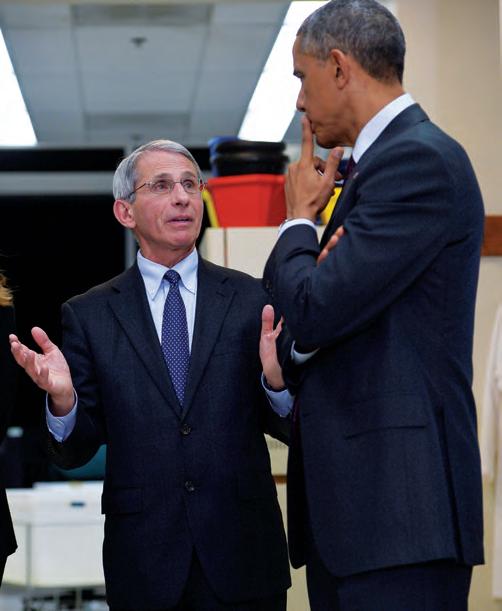
When I asked Fauci who his mentor was at the beginning of his career, he
cited Dr. Sheldon Wolff, a former director of NIAID. “He recruited me to come to the NIH after my residency in New York City and he was the most wonderful person,” Fauci said. “I was so young, and he gave me a lot of responsibility and resources to do my research, which allowed me to advance pretty quickly. He was so generous and supportive, and I’ll never forget that.”
Fauci said the best days he can recall in the office also coincide with his greatest achievements. “There were four major levels of accomplishment. First, when I was a scientist out of the spotlight in the late ’60s and early ’70s, I developed effective therapies for formerly fatal and rare inflammatory and immune-mediated diseases. Up to the point of the therapies, the disease was 90 percent fatal, and with the therapies, we turned that around to 93 percent remissions, which was a huge achievement at that time.”
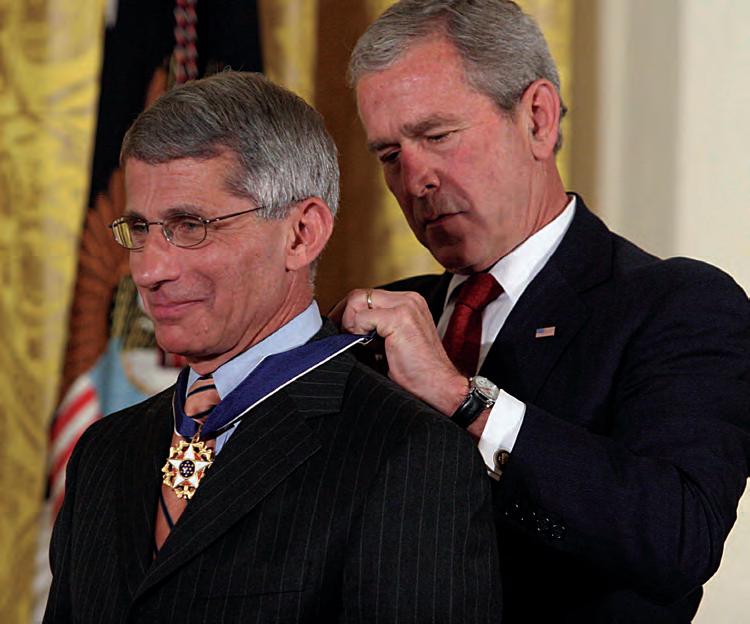
“Next, it was the summer of 1996 when the results of the clinical trials came in that showed the success for a combination of drugs and protease inhibitors that reduced the level of the HIV virus indefinitely,” he adds. “Up to that time, AIDS was a death sentence in most cases, so that was without a doubt one of the best days here at the institute, because now people can basically live normal lives.”
Fauci said the next milestone occurred on January 28, 2003, when President George W. Bush accepted his proposal for PEPFAR and talked about it in his State of the Union address that day. “That is a phenomenally successful program, and during the last 20 years we have saved 20-25 million lives worldwide,” Fauci said.
And more recently, it was his institute’s initial success with a COVID vaccine in July of 2021. “We expected the results to show, at best, 65-70 percent effectiveness at fighting the virus, and when the trials showed that the vaccine was 95 percent effective, well, that was just a very memorable day.”
Finally, when Fauci was asked who the most influential person in his life has been thus far, he immediately said his wife, Christine. “She has been my anchor throughout a very stressful professional life and has always been there to soothe me during all the crazy and hectic times. She’s been so supportive to me and my career, and I look forward to our new future together.”
JANUARY / FEBRUARY 2023 T HE ADVOCATE 35 KAREN BLEIER/GETTY IMAGE (BUSH); MANDEL NGAN/GETTY IMAGES (OBAMA)
John Casey is editor at large for The Advocate
ABOVE President George W. Bush presents the Presidential Medal of Freedom to Anthony Fauci. The Presidential Medal of Freedom, the nation’s highest civilian award, recognizes exceptional meritorious service
BELOW Anthony Fauci (L) speaks to U.S. President Barack Obama during a tour of the vaccine research center at the National Institutes of Health
Brittney Griner, who was detained at Moscow’s Sheremetyevo airport last year, is escorted to a Russian courtroom to hear the court’s final ruling on her arrest
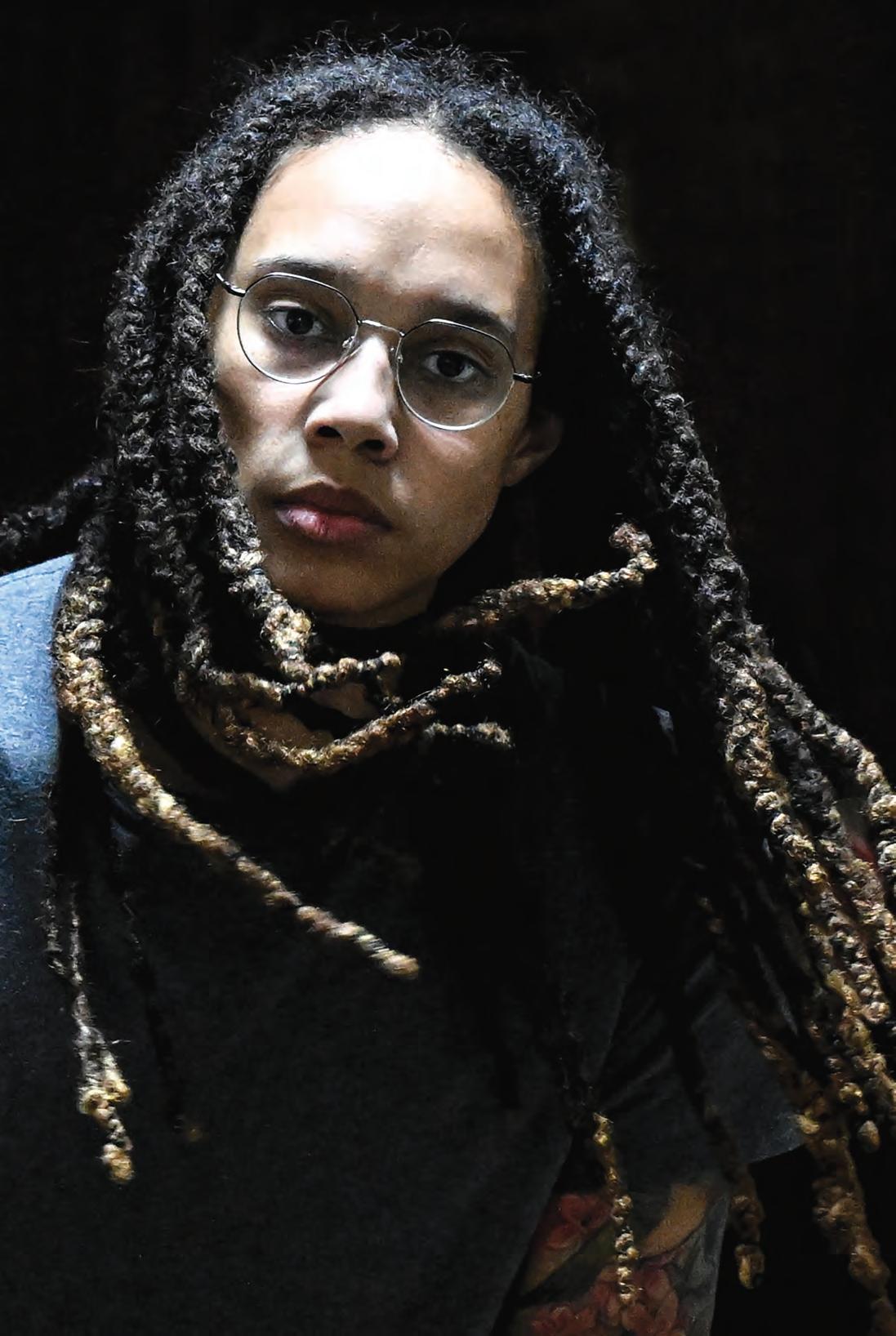
KIRILL KUDRYAVTSEV/GETTY
IMAGES
When the world’s most famous female athlete was arrested in Russia — days before that nation started a war — it set off a desperate nine-month scramble.
BY CHRISTOPHER WIGGINS
Suppose you are 31 years old, in the prime of your life. You have won two gold medals at the Olympics and been a seven-time WNBA All-Star. You’re married to Cherelle, the woman you love and the one you envision a happy future with. The opportunity arises for you to showcase your talent abroad, so you pack your bags and board a plane. But when you land, instead of gaining attention for your on-the-court plays, you’re wrongfully detained in a country that’s just started a war that your home nation is on the other side of.
You’re also a gay woman of color in a less than tolerant society.
Now what?
JANUARY/ FEBRUARY 2023 T HE ADVOCATE 37
SHEILA JACKSON LEE
For Brittney Griner, who was freed from Russian imprisonment in December after nearly 10 months of detention, this was an acute reality.
Griner, or BG as she’s affectionately known, has suffered the geopolitical consequences of being a famous Black gay athlete — she played for nearly seven years with the Russian team UMMC Ekaterinburg in the Russian Women’s Basketball Premier League, as well as a decade for the Phoenix Mercury.
BG was sentenced to nine years in a penal colony after being arrested at a Moscow airport February 17 for possessing two vape cartridges containing a minute amount of cannabis oil. BG pleaded guilty to what she called an “honest mistake” and was convicted in August, but her appeal of the nine-year sentence a judge handed down was denied in October.

The Federal Customs Service of Russia said Griner was passing through the green channel at Moscow’s Sheremetyevo Airport upon arriving from New York when she was found to be in possession of illegal drugs and detained. As part of its investigation into alleged large-scale drug transportation, the agency opened a criminal case.
U.S. Rep. Sheila Jackson Lee, whose Texas district includes the Houston area where the Griners live, was in Lithuania and Ukraine when the Russians took BG and the Russian invasion of Ukraine began.
“I had been there for a couple of days, engaging with Europeans on the possibility of Russia going into Ukraine and believing that collectively with European leaders and others, [Russian President Vladimir] Putin would stand down,” Jackson Lee says. “So it was a shock as I watched him begin to go into Ukraine to take that country. Later it was a shock to learn they took Brittney.”
Upon returning to the United States, when it became clear that BG had been detained, Jackson Lee hoped that the efforts under way to get BG out would be quietly successful — but she feared that the highest levels of the Russian government were prepared to leverage the arrest for their benefit.
Jackson Lee, a senior member of the House Judiciary Committee, the chairwoman of the Subcommittee on Crime, and a member of the Homeland Security Committee, acutely understands how political hostage-taking works.
“I want to be clear that they took her. The Russians took her and nothing else,” Jackson Lee says.
“She was in an airport. She had a minute, minuscule, an unbelievable amount, if you will, of whatever was alleged,” Jackson Lee says, while clarifying that she doesn’t believe anything the Russian government has put forth in this case.
Lee explains that while Russian laws are certainly different, it would have been feasible for the nation to deport BG immediately.
“You can send the person back on a plane, back to the United States, or if they were from Great Britain, or if they were from France, you can send them right back,” Jackson Lee says as she becomes exasperated. “They’re in the airport! There is absolutely no reason for you to take them anywhere.”
Nothing gets done in Russia without the blessing of Putin, Jackson Lee says. She’s convinced that somebody got word to Putin of BG’s arrival at the airport (“She was coming back to play after being there for seven years. Seven years, and a 6-foot-9 person is not hard to recognize.”) BG was then detained as a political pawn because of his whims, Jackson Lee says.
“To know what was going on, Russia is truly under Putin. It is truly the Iron Curtain,” she adds. “There’s no freedom for the people. There’s no freedom for anyone that comes to Russia.”
Jackson Lee takes a deep breath and continues.
“But let me be very clear. Vladimir Putin is inhumane. He’s inhumane against people of color. He’s inhumane against LGBTQ [people], as we all know.” In fact, Putin signed into law a new draconian anti-LGBTQ+ law just days before Griner’s release.
On March 23, a U.S. official in Russia was finally granted access to BG, later reporting that the WNBA star was doing “well.” Over months she would appear on Russian television
38 T HE ADVOCATE JANUARY / FEBRUARY 2023
CHRISTIAN PETERSEN/GETTY IMAGES
But let me be very clear. Vladimir Putin is inhumane. He’s inhumane against people of color. He’s inhumane against LGBTQ [people], as we all know.
—REP.

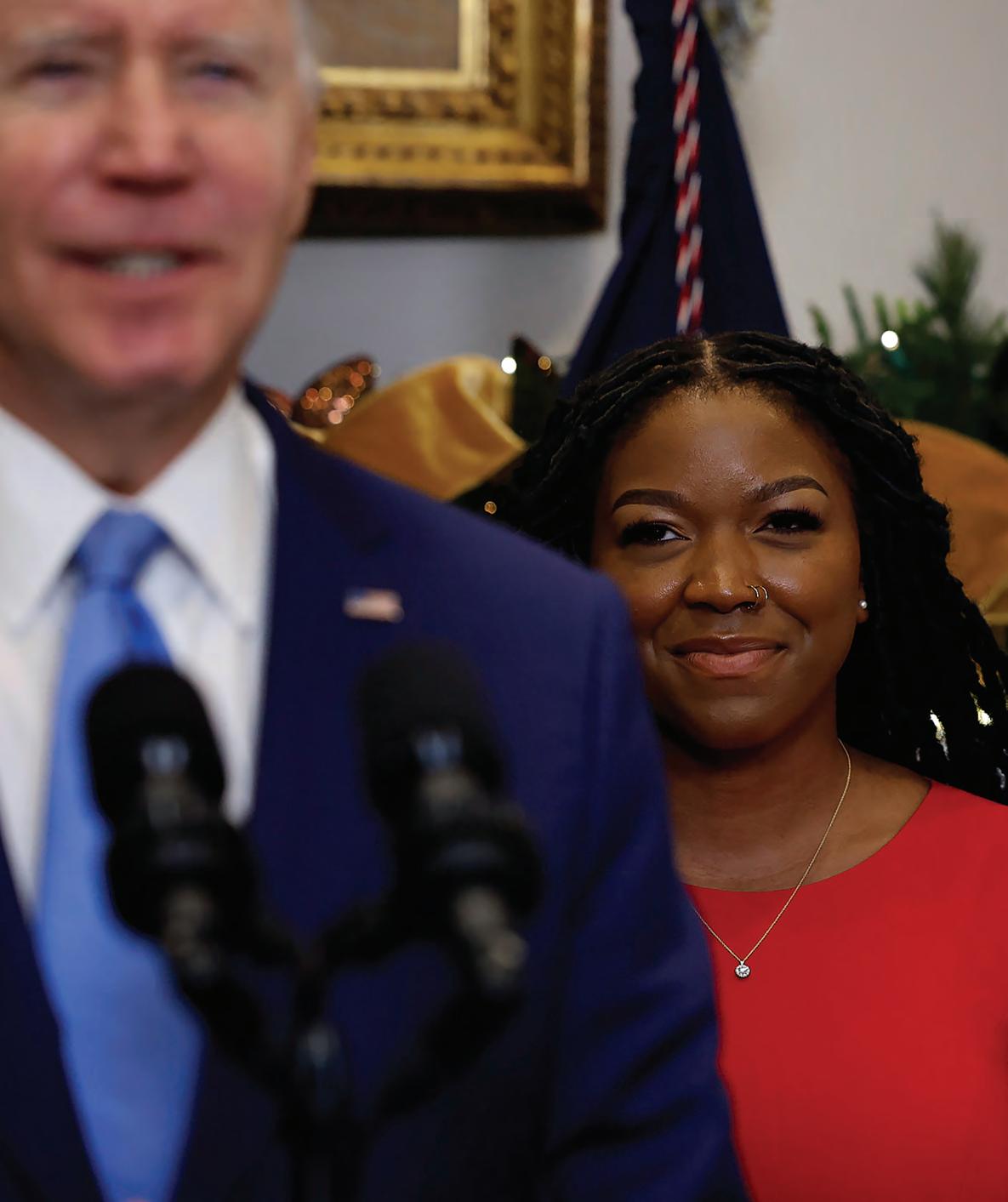
40 T HE ADVOCATE JANUARY / FEBRUARY 2023
CHIP SOMODEVILLA/GETTY IMAGES
Cherelle Griner (right), wife of Olympian and WNBA player Brittney Griner, listens as President Joe Biden announces Brittney’s release from Russian custody at the White House on December 8, 2022; Brittney was released as part of a prisoner swap that involved Russian arms dealer Viktor Bout
during her court hearings. She was always shackled and led through the narrow corridors of the court.
Jackson Lee says a little-known new group within the State Department was integral in moving BG’s case forward.
“Both Brittney Griner and Paul Whelan [a former U.S. Marine held in Russia for the past four years, ostensibly for spying] are classified as wrongfully detained under the Levinson Act,” a senior administration official explained prior to Griner’s release. “The U.S. Government’s efforts to bring them home involves a coordinated effort that draws on multiple agencies across the government and utilizes all of the U.S. government’s expertise and resources. Day in and day out, the White House works closely with the Hostage Recovery Fusion Cell and the Office of State Department Special Presidential Envoy for Hostage Affairs, who lead efforts on hostage and wrongful detainee efforts.”
The Levinson Act, which Congress enacted in 2020, dictates much of the activity surrounding wrongfully detained Americans in other countries, a State Department official notes.
“It codified elements of wrongful detention policy and laid out criteria for the department to use when we’re looking at cases where U.S. citizens might be held wrongfully,” the official stated.
The senior administration official added, “The United States government has been demanding consular access to both Brittney Griner and Paul Whelan, the other wrongfully detained American in Russia. They have not offered consistent consular access.”
While the senior administration official wouldn’t speculate on Russia’s motivations for taking Griner, the
official said that it’s evident that her status as a well-known, high-profile person was a factor.

“She’s not just famous in the United States,” the senior administration official said. “She’s also quite famous in Russia.”
Jackson Lee says that creative solutions were proposed from the beginning.
“We thought that the team could get around [the detention]. Then we thought that the oligarch who owned the Russian team could get around it, but none of that worked,” Jackson Lee says. “And there was a period of time we were trying to get the United States and others, the Moscow Embassy, to deal with it diplomatically.”
Meanwhile, BG’s fate in the Russian judicial system was speeding along. It quickly became clear that BG would be made to stand trial in a justice system where more than 95 percent of those charged with a crime are convicted.
BG tried to appeal to the judge’s sense of humanity as she pleaded for leniency.
“I want the court to understand that it was an honest mistake that I made while rushing and in stress trying to recover post-COVID, and just trying to get back to my team,” she told a Russian court in August. Her contrition, however, served no benefit, and she was sentenced to nine years of confinement.
During her court appearances, the nearly seven-foot-tall BG was placed into a small cage where she couldn’t stand straight but had to remain on her feet.
“The treatment was inhumane being in that cage,” Jackson Lee says. “We had to fight to get her to be able to sit down as opposed to stand up because she was too tall to stand up in that cage.”
Jackson Lee says that at the outset she was inclined to make a lot of noise to get the Biden administration’s attention but that she took a less public approach at BG’s family’s request.
“The family had great concerns,” Jackson Lee says. “It’s her family. And family takes priority. We listen to them. We honor them, and we respect them.”
While the U.S. diplomatic effort to free Griner was complicated by Russia’s war in Ukraine, part of their work was as a support system to Cherelle and Griner’s family.
A State Department official explains that teams handling cases of Americans wrongfully detained in foreign countries are dedicated to supporting the families of those detained abroad. After BG was declared wrongfully detained May 3, a new section of the State Department took the lead on her case — the Office of the Special Presidential Envoy for Hostage Affairs.
JANUARY/ FEBRUARY 2023 T HE ADVOCATE 41
 CHRISTIAN PETERSEN/GETTY IMAGES
CHRISTIAN PETERSEN/GETTY IMAGES
“There is a dedicated team working on this day in and out that cares deeply about it,” the senior administration official said prior to Griner’s release. “There’s not a day that goes by that these cases aren’t being actively discussed. Every day the question is asked: What can we try next?”

The State Department official with whom The Advocate spoke explains that every family of a wrongfully detained individual is assigned a case officer who reports to the U.S. Special Presidential Envoy for Hostage Affairs, Roger Carstens, who oversees the cases.
“We are on call 24/7 for those families. If there’s anything that they want to reach out to us about, any questions that they have, anything that they need us to track down, we are available to them,” the State Department official noted.
Since 2015, when a spate of wrongful detentions in Syria and Iraq took place, the State Department began to focus more on the needs of families.
“Something that we put a lot of our effort into is family engagement and talking with the families, representatives of the individual, whoever it may be,” the official added. “That is a full-time, 24/7 commitment that we make to the family members or the representatives depending upon the person. That means we’re there for them. We give them updates based on their schedule and what they prefer. Some families like to have regularly scheduled meetings once a week. Some families don’t like to talk at all. Some families only want to talk to us when they have news, but we modify our communication plan with the families based on what their needs are.”
The official also notes that the U.S. government expects prisoners in Russia sent to penal colonies to receive regular consular access.
One problem, they say, is that many of these penal colonies are more than eight hours away from Moscow
JANUARY/ FEBRUARY 2023 T HE ADVOCATE 43
by car. Additionally, the Russian government controls access, which it sometimes grants on an unreliable basis.
“We expect that the Russians will uphold their legal obligations under the convention on consular relations where they have to allow access,” the State Department official said in advance of BG’s release. “We expect that they will continue that, and we will continue to demand that if it’s not coming in a timely fashion.”
On November 9, when BG’s transfer to a penal colony was initiated, she vanished. All parties were initially left in the dark about the transfer to the colony, where she would serve her sentence.
The process of moving people sentenced to punishment in penal colonies is called etap and is designed to be opaque as part of the punishment process, according to the Polandbased Centre for Eastern Studies.
People convicted of crimes are often transported in windowless railroad carriages known as Stolypin cars, but neither the sentenced individual nor their family knows where they are going.
Human rights activists often criticize penal colonies for their distance from densely populated areas, preventing inmates from having regular contact with their families and attorneys.
In Russia, there are four types of prison colonies, each with its own incarceration regime. As a rule, prisoners in colony-settlements are free to move around the facility, live in large barracks, regularly leave on passes, visit family, and dress as civilians. They are generally the least strict of prisons and mostly for those who have served a significant portion of their sentence.
A prison colony under the ordinary regime is highly supervised by its guards. The inmates live in large barracks with more than 100 beds. They are constantly supervised
and cannot move about freely. Inmates living in a strict or special prison colony are usually restricted; they usually live in locked cells with up to 50 others.
After more than a week without visibility into where BG was, on November 17, her lawyers, Maria Blagovolina and Alexander Boykov, sent The Advocate a statement outlining that BG was brought to IK-2 in Mordovia, about 300 miles from Moscow. IK-2 is classified under the ordinary regime security level and is known for its abuse of prisoners.
“We visited her early this week,” her legal team wrote. “Brittney is doing as well as could be expected and trying to stay strong as she adapts to a new environment. Considering that this is a very challenging period for her, there will be no further comments from us.”
Brittney’s transfer to what some would call a gulag, paired with the U.S. midterms — where Republicans, never seen as particularly sympathetic toward Griner, fared relatively poorly — appeared to mark a new, urgent chapter of negotiations.

President Biden said during a postelection press conference that he was committed to securing BG’s release.
“My hope is that, now that the election is over, Mr. Putin will be able
44 T HE ADVOCATE JANUARY / FEBRUARY 2023 JEMAL COUNTESS/GETTY IMAGES FOR TAKE BACK THE COURT ACTION FUND
Congresswoman Sheila Jackson Lee, who helped in the fight for Griner’s safe return, speaks at a press conference in July 2022 in Washington, D.C.
President Biden, Vice President Harris, Secretary of State Antony Blinken, and Cherelle Griner speak to Brittney on the phone after the administration negotiated her release

to discuss with us and be willing to talk more seriously about prisoner exchange,” Biden said at the time.
Then, on December 8, before 8:30 a.m. Eastern, news of a successful negotiation for BG’s release was cause for celebration for her family, friends, teammates, and supporters. Flanked by BG’s wife, Vice President Kamala Harris, and Secretary of State Antony Blinken, Biden announced the joyous news ahead of the holidays.
“Moments ago, standing together with her wife, Cherelle, in the Oval Office, I spoke with Brittney Griner,” Biden said. “She’s safe. She’s on a plane. She’s on her way home.”
Biden continued, “After months of being unjustly detained in Russia, held under intolerable circumstances, Brittney will soon be back in the arms of her loved ones, and she should have been there all along. This is a day we worked toward for a long time. We never stopped pushing for her release. It took painstaking and intense negotiations, and I want to thank all the hardworking public servants across my administration who worked tirelessly to secure her release.”
After Biden announced BG’s release, he gave her wife Cherelle the floor.
“Over the last nine months, you all have been so privy to one of the darkest moments in my life,” she said, “and so today I’m just standing here overwhelmed with emotions — but the most important emotion that I have right now is just sincere gratitude for President Biden and his entire administration.”
Cherelle thanked Harris, Blinken, National Security Advisor Jake Sullivan, and others, noting that it took the work of dozens of people to bring BG’s case to a positive conclusion.
Similarly to BG, Whelan has been wrongfully detained in Russia since 2018. The former Marine was convicted on espionage charges — charges he denies — in 2020 and sentenced to 16 years of imprisonment in a similarly unfair
trial. The Biden administration had been attempting to negotiate the release of both BG and Whelan in exchange for a prisoner important to the Russian government, but, according to the Biden administration, Russia made a take-it-or-leave-it offer for BG or nobody at all.
In exchange for BG’s release, the U.S. released convicted Russian arms dealer Viktor Bout. For many, the joy of Griner’s freedom was paired with frustration as an international criminal was given the same deal as someone carrying tiny traces of cannabis oil in her luggage. Cherelle Griner intimated that she hoped Whelan would have been part of the agreement that freed her wife.
“Today, my family is whole, but as you all are aware, there are so many other families who are not whole,” she said. “BG and I will remain committed to the work of getting every American home, including Paul, whose family is in our hearts today, as we celebrate BG being home.”
Cherelle’s pledge concluded with empathy.
“We do understand that there are still people out here who are enduring what I endured the last nine months of missing tremendously their loved ones,” she said.
JANUARY/ FEBRUARY 2023 T HE ADVOCATE 45 ADAM SCHULTZ/GETTY IMAGES
BY RICKY CORNISH PHOTOGRAPHY BY MAXWELL POTH

CHEYENNE JACKSON on what it’s like juggling a bustling career, a happy marriage, and two precocious kindergartners.
F8KE CHEMICAL CLUB peacock blue knit buttondown shirt; RAT BETTY rings

JANUARY/ FEBRUARY 2023 T HE ADVOCATE 47
photographer’s assistants OWEN DEVALK and DUSTY HEGER stylist MEESH DARANYI groomer PAIGE DAVENPORT
CHEYENNE JACKSON was breezy and relaxed when he spoke to us this fall at his home in the L.A. suburb of Granada Hills. Things seemed a lot lighter then — it was just a few weeks before his costar in the Fox sitcom Call Me Kat, beloved gay icon Leslie Jordan, would die suddenly after a medical emergency that preceded a car accident.
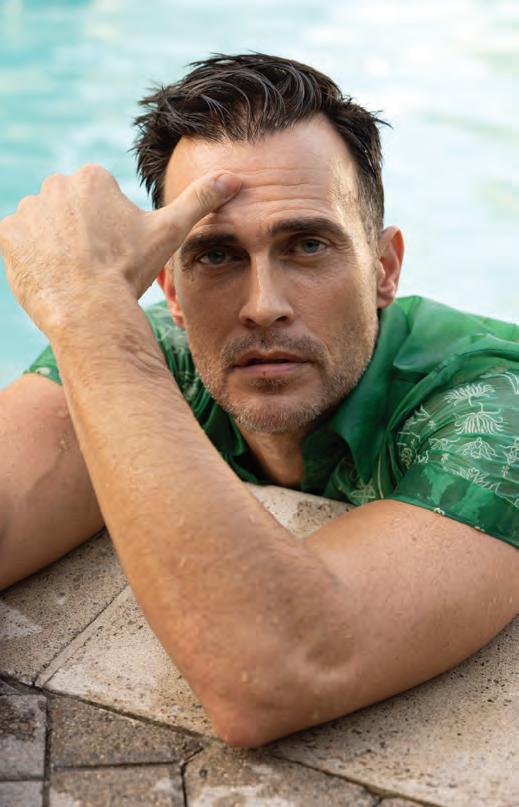
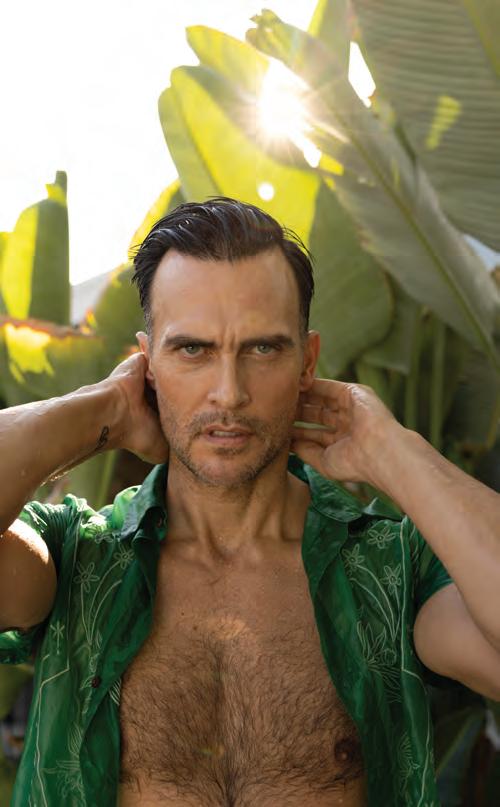
Jackson was so distraught by his friend’s passing he declined to speak to us for a follow-up interview. His role on Call Me Kat — where he plays Kat’s buddy, Max — will continue following Jordan’s death (Jordan’s character, a cat cafe employee, is ostensibly getting a happy ending on-screen). The quirky Kat, now in its third season, is the latest career milestone for Jackson, who has been everything from a Broadway draw ( Xanadu , Into the Woods) to a major motion picture star (United 93, playing 9/11 hero Mark Bingham) to a Ryan Murphy darling (American Horror Story: Hotel and AHS: Roanoke), with a recent Daytime Emmy nomination (for the Netflix series Julie and the Phantoms) under his belt.
His comfort in the present state of his career and personal life is evident during his interview. He sits crisscross on a pillow, speaking with pride of being on the cover of The Advocate 15 years ago, where he opined on being a working gay actor in the age of George W. Bush and the Republican war against marriage equality. Even then, he was so excited to be living the life he was, far from his painful childhood.
“Growing up queer, different, in the little town that I did in northern Idaho, I just always knew that I didn’t belong. I never felt like these were my people,” Jackson says now, sitting up straight. “It never felt like home to me. Once I started to find my people in community theater, I started to really feel ok in my skin. My biggest journey in life really
is the journey of being comfortable in my skin and in my body. At 47 years old, it’s still a daily struggle for me.”
Many things have changed since 2008 — he’s more than just a working gay actor, he’s a married father.
Jackson can’t help but beam when talking about the people he spends his life with. The star is wed to actor Jason Landau, with the couple celebrating their eighth anniversary last September.
“I met him at an AA meeting 10 years ago,” Jackson says. “He was just this cranky, angry, talkative guy. I could see his heart and his brokenness. I just got him and we just got each other.”
The couple is also parenting six-yearold twins, Willow and Ethan.
“I always knew I wanted to be a dad, even at 7 or 8 years old,” Jackson says. “There really are no words to describe the love I have for my family. I miss them when I’m with them. They go to bed every night and I look at pictures of them from the day even though I just spent all day with them.”
As Jackson’s come to learn, there’s no perfect way to raise a child.
“It is the hardest job I’ve ever had,” he says. “Jay and I are pushed to the limit because we are extremely hands on and that’s how we want it. We are there for every single bedtime, for every single meal, every high and every low. You’re not raising kids, you’re raising humans.”
48 T HE ADVOCATE JANUARY / FEBRUARY 2023
VINTA GALLERY unisex art deco short sleeved barong
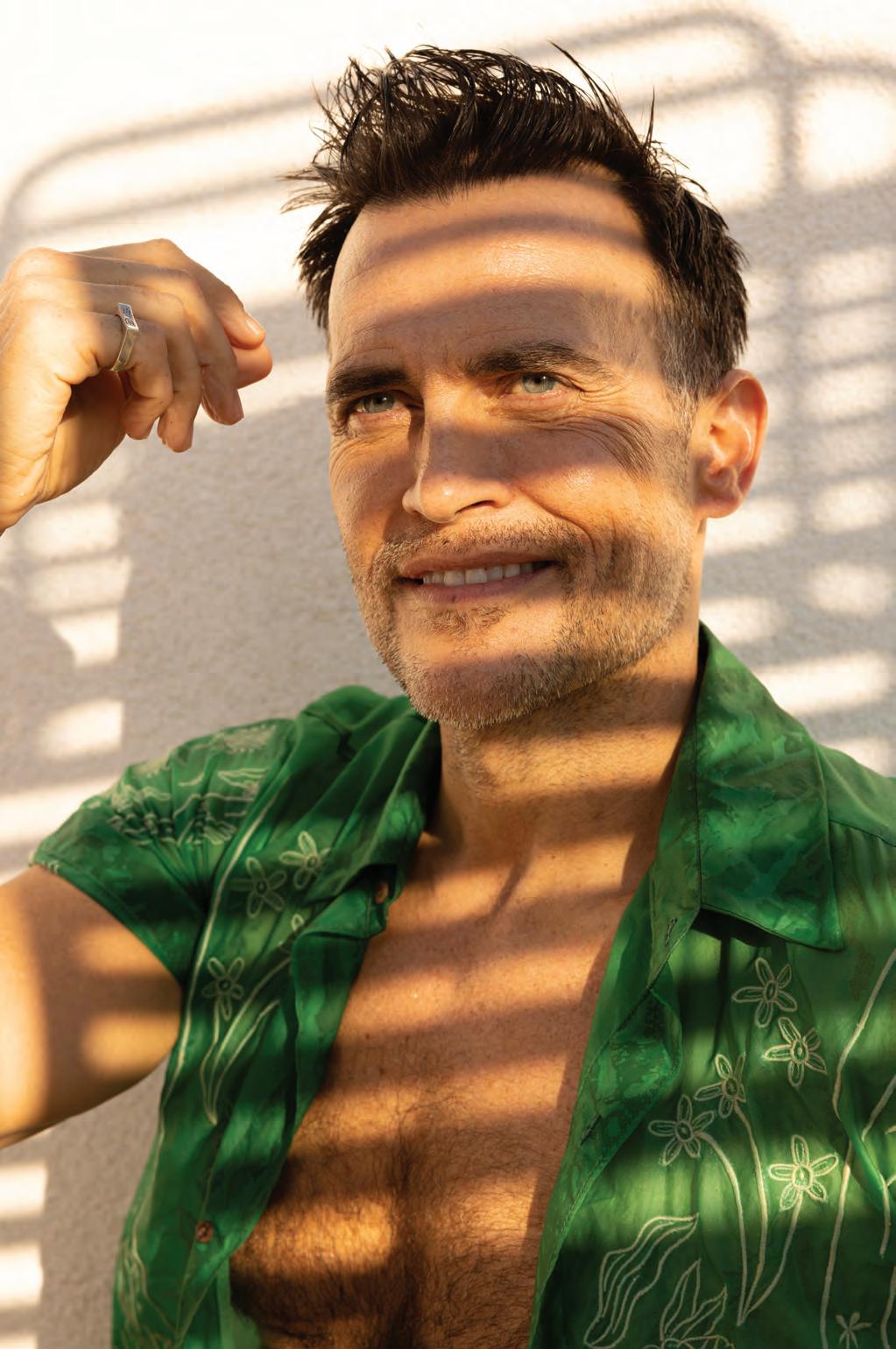
JANUARY/ FEBRUARY 2023 T HE ADVOCATE 49
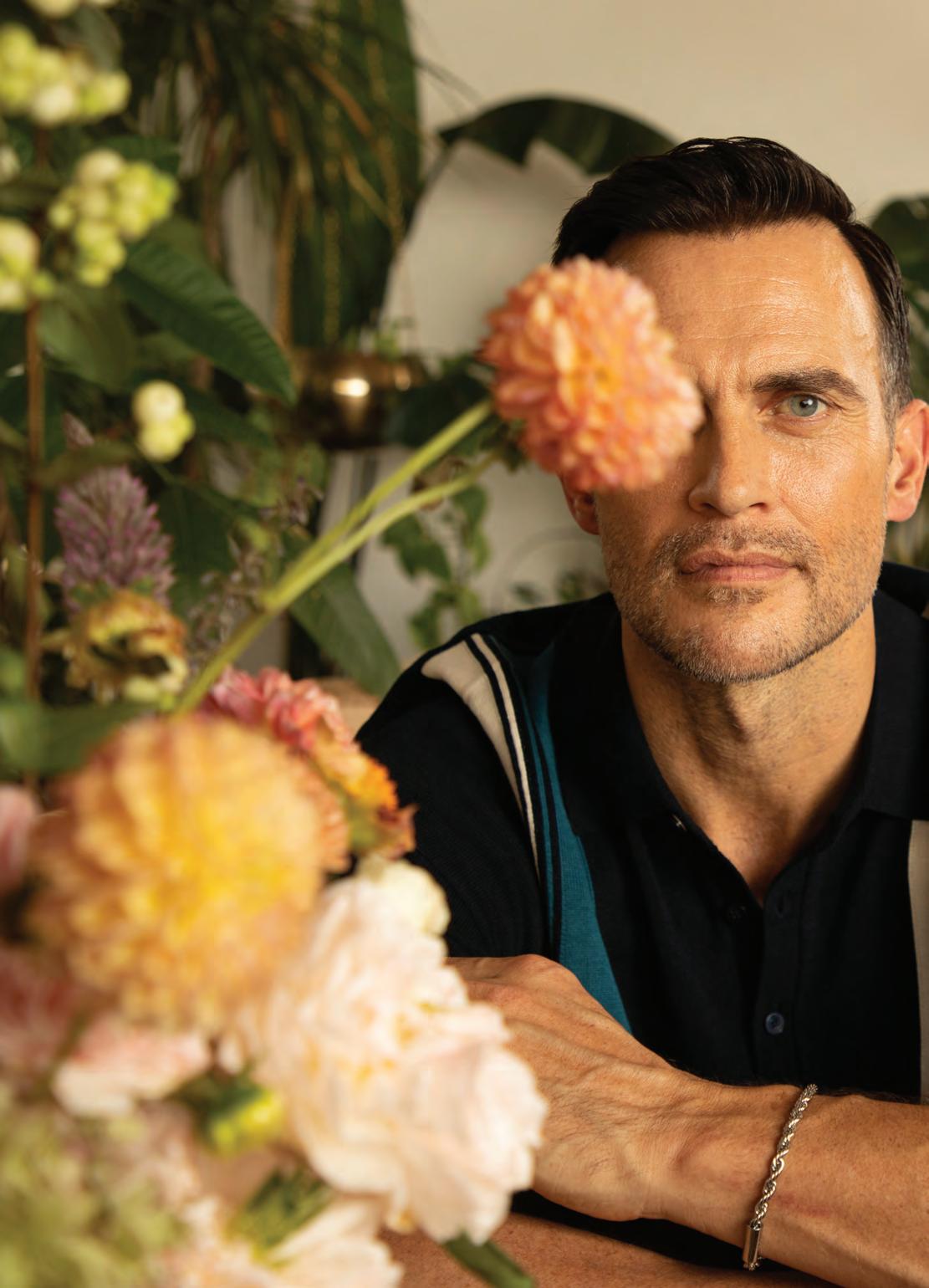
50 T HE ADVOCATE JANUARY / FEBRUARY 2023
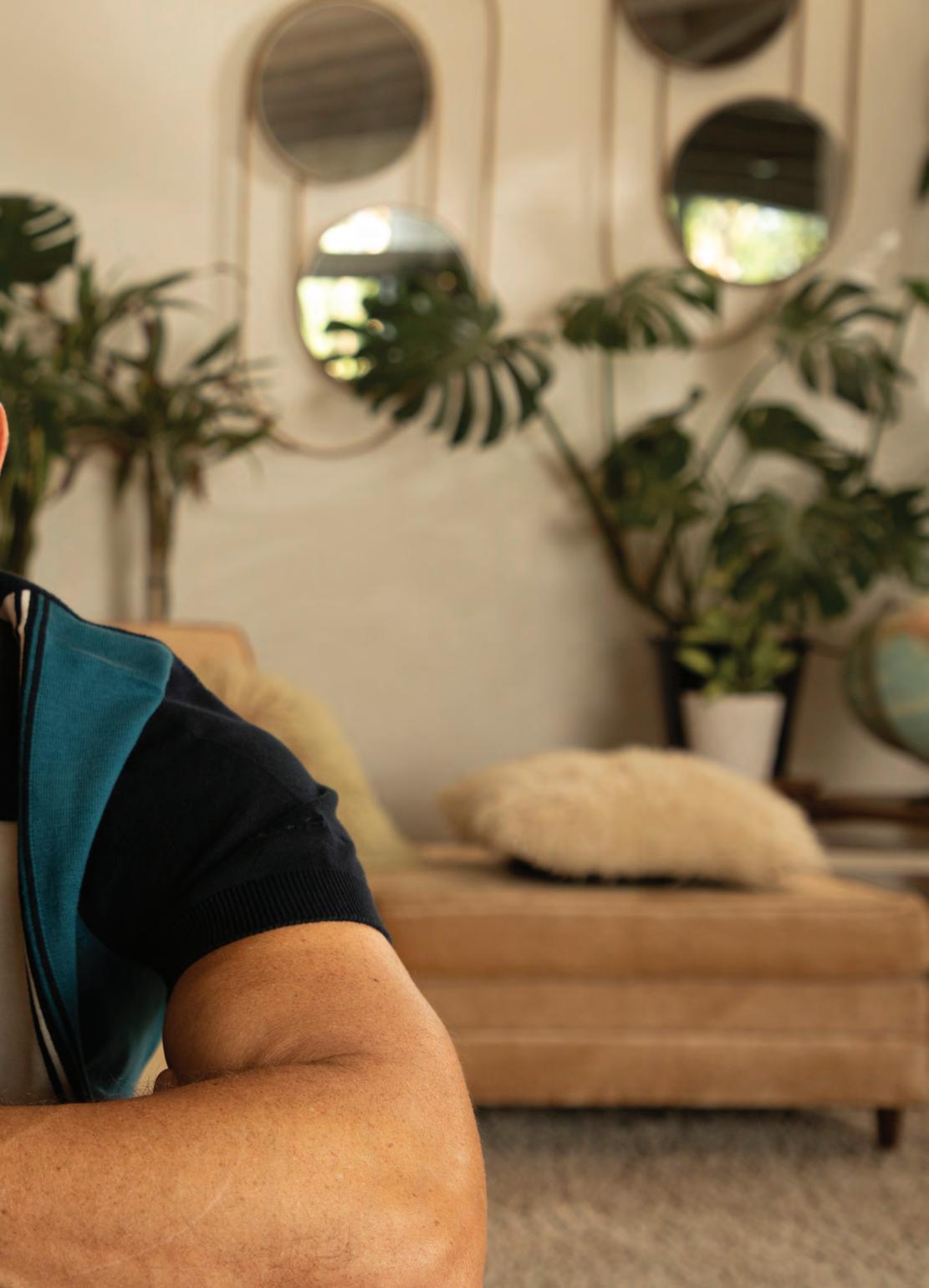
JANUARY/ FEBRUARY 2023 T HE ADVOCATE 51
BEN SHERMAN Navy signature mod knit colorblock polo; ice link men’s Franco bracelet 5mm
With the extreme challenges parenting can bring, the small moments are what Jackson holds on to. As the kids begin a new chapter by going to school, Jackson says he’s working to enjoy every second he can get.
“I want them to be people in the world that make it a better place,” he says. “I was picking them up from kindergarten the other day and I see my son and my daughter surrounded by each of their kindergarten teachers. All four of them were singing ‘Seasons of Love’ from Rent at the top of their lungs. That is my dream! This is all I’ve ever wanted… to have kids spreading love and happiness.”
Balancing career, parenthood, and marriage is a struggle for everyone, but especially for same-sex couples who have little in the way of societal examples.
“We work really hard at [our relationship] and it doesn’t come easily,” Jackson says. “You have to be willing to have those conversations and sit in those uncomfortable moments. It’s hard to feel vulnerable and you really have to put yourself out there.”

When stressed, it’s easy to shut down in a relationship, but Jackson always pushes himself to communicate — both expressing his own feelings and absorbing those of his husband’s.
“Some days I’ll come home from work and I’ll just be full,” Jackson says. “Work has been a day, the dogs are going crazy, one of the kids is having a meltdown… sometimes I don’t want any feedback. I don’t want any advice. During those moments, we’ll ask each other if we want feedback or if we just need to be a receptacle. It’s so important. When I’m stuck on something, I can reach out and feel heard and seen.”
Although Jackson’s Instagram may seem like a dream life, the actor says nothing is perfect. Like most working parents, he’s exhausted, but his ability to appreciate what he’s achieved in his life and his ability to stay in the present allows him to keep everything in perspective.
“Everyone says to live in the moment, but one of my mentors, Jamie Lee Curtis, says it best: ‘Be where your feet are.’”
52 T HE ADVOCATE JANUARY / FEBRUARY 2023
F8KE CHEMICAL CLUB peacock blue knit buttondown shirt; OTD. NYC brown cargo pants; AMERICAN OPTICAL sunglasses; PYRRAH necklace
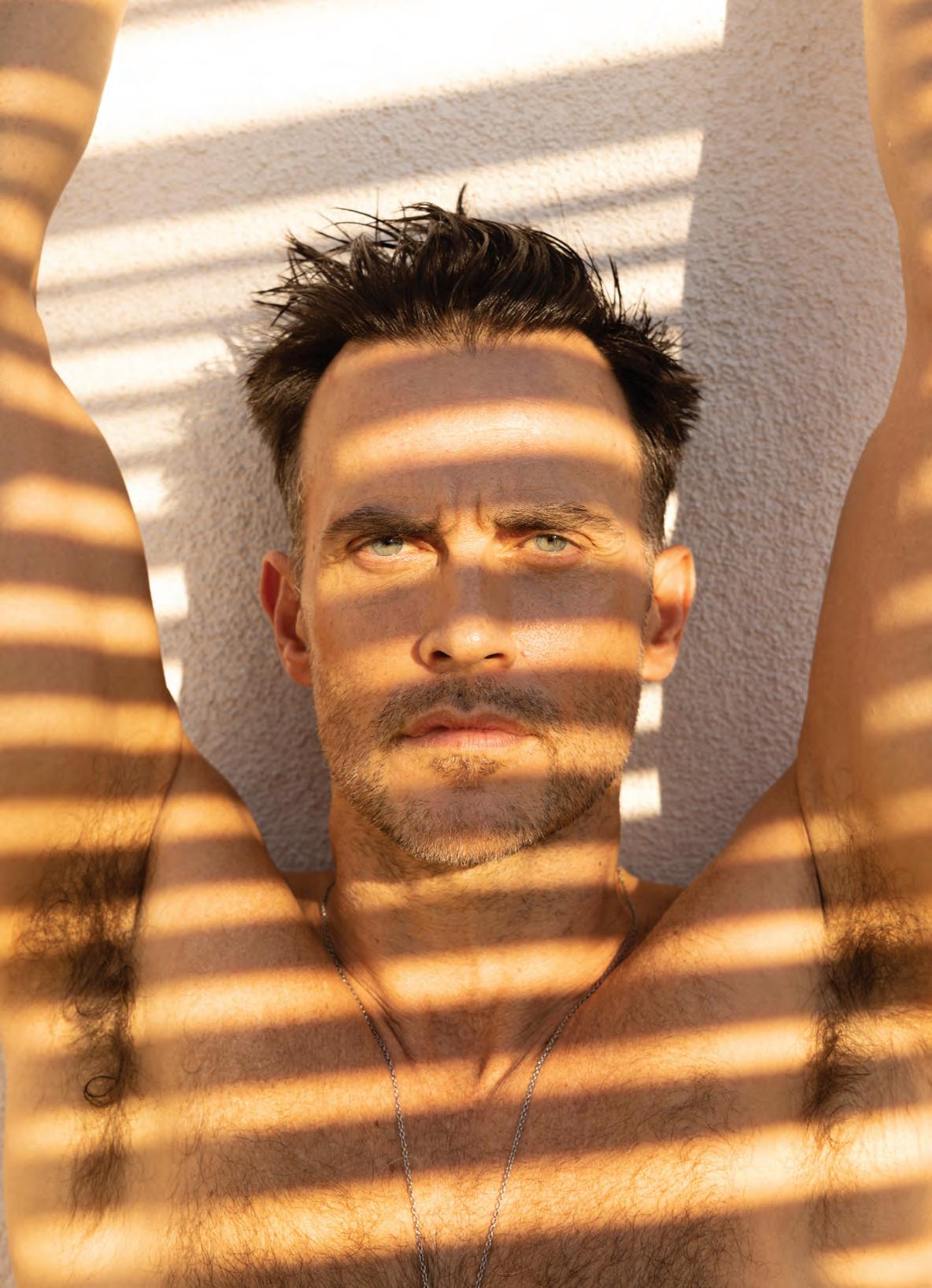
OH NO, NOT AGAIN
An attack on one of us feels like an attack on all of us. Here are 10 ways to deal with vicarious trauma.
 BY DUSTINA HAASE-LANIER
BY DUSTINA HAASE-LANIER
THESE DAYS IT feels like every time we turn on the news, there is another incident of hate against the LGBTQ+ community. Whether it’s “don’t say gay” legislation or the senseless act of violence committed at Club Q in Colorado, being exposed to other people’s trauma — especially that of people who are part of a group one identifies with — can cause one to experience that trauma vicariously. It’s not unlike what first responders experience when dealing with daily suffering. This vicarious trauma has real impact on one’s mental well-being, so here are 10 ways to help mitigate some of those effects:
Remember that every response to trauma is valid. You may find that you are experiencing feelings that are extreme, rapidly changing, or that seem unlike you. Validate those feelings. Wellness apps like Better Health have more info about trauma reaction.
Physical self-care is important, even if you don’t feel like it. Rest. Try to get at least eight hours of sleep a night or take short naps when needed. Eat healthy meals as much as possible. If that proves difficult, eating several small snacks throughout the day is helpful. Exercise. Taking a walk in a safe place can be balancing, especially with a friend.
Take time to feel the feelings. Rage, sadness, fear, being overwhelmed, and even numbness are all valid responses to trauma.
Get help and talk to a trained professional. Disaster Distress Helpline provides 24/7, 365-day-a-year crisis counseling and support to people experiencing emotional distress related to natural or human-caused disasters. Call or text 800-985-5990. Deaf and hard-of-hearing callers can connect directly to an agent fluent in American Sign Language by clicking the “ASL Now” button on the website or calling 800-985-5990 from a video phone. ASL support is available 24/7. Para español: llama o envía un mensaje de texto 800-985-5990, presiona “2.”
Connect with the community. Share time with safe LGBTQ+ people in your life. Find an organization that is supporting the community. Being present with folks who have similar experiences and are feeling the same trauma can help you stay grounded.
Take time and space away from people. At times, silence is just what you need to process your emotions and gain perspective. However, isolation can lead to loneliness, depression, and anxiety when it lasts too long or is used for the wrong reasons. So, make sure you check-in with friends and family to create a safety net.
Practice mindfulness, grounding, and centering. Meditation can be a useful tool to keep you rooted in the moment. Focus on your breathing, listen to calming music, go to a welcoming church, or find a space and time that encourages peace. Even walking barefoot in the grass can increase health and wellness.
Help others who are experiencing similar feelings. This can be empowering and validating. Create or volunteer at a memorial for Club Q victims and their families. Donate money to a related charity or reach out to a friend who you know needs some support.
Physical connection with someone safe can increase serotonin. Holding hands, hugging, or snuggling are ways to release some of the pain and feel connected and loved. However, unsafe people or connections can compound feelings of loss and fear, so choose carefully.
Work on individual and community safety. Contact LGBTQ+ groups or centers in your area. Create safety plans for yourself when you’re going to be in an LGBTQ+ space. Working on safety plans inside queer spaces can increase your feelings of safety and long-term security.
Dustina Haase-Lanier holds a master’s degree in social work and has specialized in trauma recovery for over 20 years.
54 T HE ADVOCATE JANUARY / FEBRUARY 2023 TANYA ANTUSENOK/SHUTTERSTOCK
MATTERS OF THE HEART
Love’s varied forms are constantly under attack from conservatives, but a new book counters the message that all families must look like a Norman Rockwell creation.
BY JD GLASS
“I LOVE MYSELF opens Together—A First Conversation About Love , coauthored by Megan Madison and Jessica Ralli, and illustrated by Ann/Andy Passchier.
Published by Penguin, this picture book is multi-cultural, multi-ethnic, and multi-faceted, and not merely queer friendly, but queer-positive among its many depictions of love between adults of all different types — complete with simple explanations, such as word balloon from a Sikh gentleman walking his dog, waving to the reader and saying, “I’m a man who loves other men—I’m gay.” He’s also wearing very cool low-top vans and an African-American lesbian couple sit on a nearby bench, with their son playing nearby.
Because Megan Madison is a trainer for the New York Early Childhood Professional Development Institute, and Jessica Ralli is the coordinator for early literacy programs at the Brooklyn Public Library, not only are the concepts and language geared for young thinkers, there are also questions, from asking children about their own families, to asking them to think of ways to help all feel included.
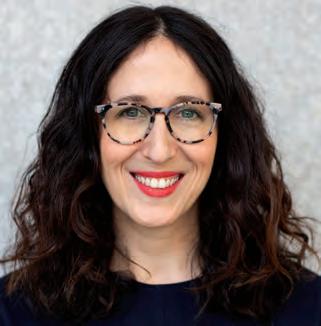

There is even a section about dysfunctional and painful families, so that even those children can feel seen. It tells them, “If someone hurts you, and anyone says it’s because that person loves you, they’re wrong.” Additionally, it encourages the child to find a person or place that can help the child feel safe, even if sometimes “the safe place may even be in your imagination.”
And it lets them know that as they get older, they’ll be able to make more decisions of their own.
Finally, it helps young readers know that many people are invested in building a world where “everyone can make a family with anybody they love.” Not a message likely endorsed by the Republican party, but one most queer people can fully embrace.
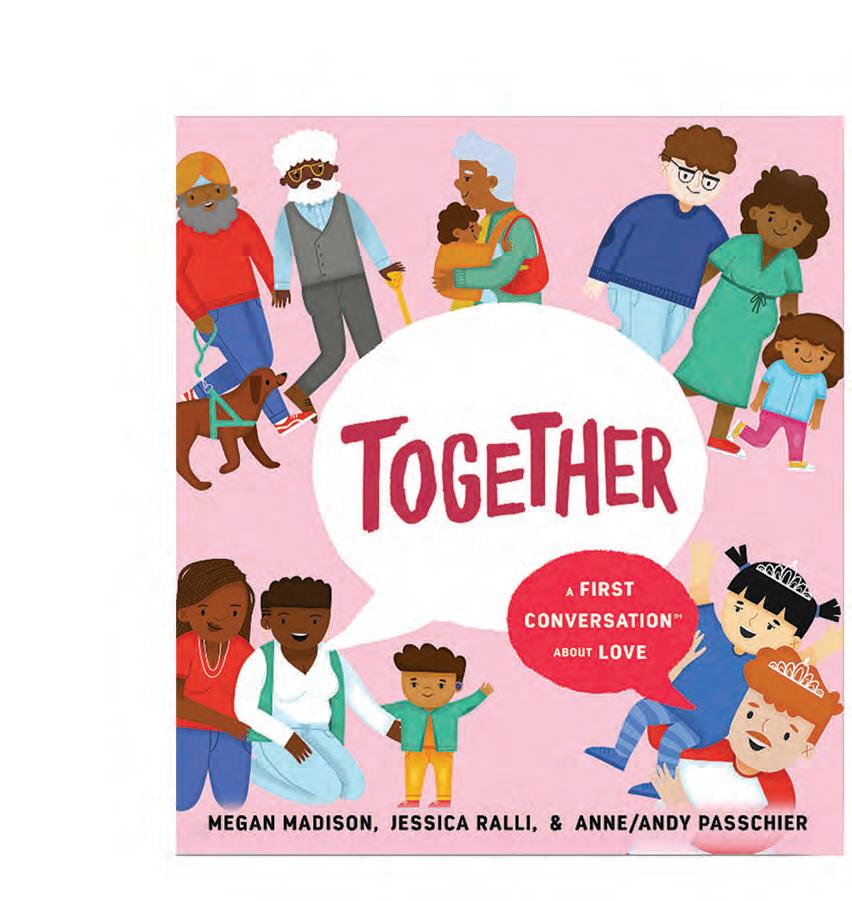

JANUARY / FEBRUARY 2023 T HE ADVOCATE 55
COURTESY OF SUBJECTS
Jessica Ralli
Megan Madison
UNIVERSAL MOTHER
Spoiler Alert star Sally Field reflects on playing moms to gay men on screen and in life.
 BY TRACY E. GILCHRIST
BY TRACY E. GILCHRIST
56 T HE ADVOCATE JANUARY / FEBRUARY 2023
She’s “another mother,” Sally Field says, explaining her character Marilyn in Spoiler Alert, the film based on TVLine founder Michael Ausiello’s memoir about loving and losing his husband Kit Cowan to a rare form of cancer in 2015. It’s true that double Oscar and three-time Emmy winner Field has played a slate of moms in her 50-plus-year career, but she’s never been just another mother — not on screen and not in life.
On the big screen, she’s starred as the fierce mother to Julia Roberts’s terminal Shelby in Steel Magnolias , the loving, supportive mother to Tom Hanks’s Forrest in Forrest Gump, and as an avenging mom in Not Without My Daughter and the thriller An Eye for an Eye . On TV, she won an Emmy for her portrayal of Abby’s (Maura Tierney) schizophrenic mom on ER and another for starring as a loving mom (Nora Walker) to a gay son played by Matthew Rhys on Brothers and Sisters at a time when
gay characters on primetime were rare. In life, Field is an outspoken equality activist for all marginalized groups, and along with her son Sam Greisman, who is gay, she’s been particularly outspoken about pushing to pass the Equality Act, which would ban discrimination on the basis of sexual orientation, gender identity, and more.
Field credits Brothers and Sisters showrunner and Spoiler Alert writer David Marshall Grant and director Michael Showalter (who directed her in the indie gem Hello, My Name is Doris) for bringing her on to Spoiler Alert to play mom to Ben Aldrich’s Kit and mother-in-law to Jim Parsons’s Michael.
“It’s a lovely piece,” Field says of the film that dropped in theaters in December. “And right now, important and timely,” she adds, referring to the increased attacks on LGBTQ+ people and rights in recent years.
“It’s just a human love story. People love each other, and there isn’t a bad guy in it. It’s just about how complicated and how hard it is to love anybody — your parents, your children, your spouse, your partner. And how important that love ultimately is,” she says.
Spoiler Alert follows Michael and Kit’s 13-year relationship from their first meeting to moving in, getting married, an amicable separation for a time, and a reunion amid Kit’s cancer diagnosis. While Marilyn and Kit’s father Bob (Tony winner Bill Irwin) love him and their son-in-law Michael unconditionally, there’s a scene early in the film where

JANUARY / FEBRUARY 2023 T HE ADVOCATE 57 COURTESY FOCUS FEATURES
xx
ABOVE In Spoiler Art, Field revisits a role she played previously: a grieving mother
WATCH ENTERTAINMENT
ACROSS Field is mother-in-law to Jim Parsons’s Michael in the modern weepie Spoiler Alert
Kit struggles to come out to them. It’s a scene familiar to Field, not merely because her Nora went through it with her son Kevin on Brothers and Sisters nearly 13 years ago, but because she understands the power of having difficult and honest conversations with parents.
“It’s hugely important, not only to own yourself but to the people you’ve known the longest and you feel the most complicated relationships with,” Field says of bringing full honesty to the people you’re closest to. “Whether you think they will be accepting or whether they will be critical, or whether they will be even worse than that, you have to own within yourself. You have to do that for the relationship with your parents if it’s ever to continue long into your adulthood.”
“I didn’t have the same issue to broach. But I did have issues that I finally had to stand up to my mother,” Field says. She’s alluding to a chapter in her memoir In Pieces, in which she
bravely shares her story of child sexual abuse at the hands of her stepfather, and eventually confronts her mother with the secrets she’d kept.
“I couldn’t let her go and not have her know that and allow her the space to embrace me. That’s really important.”
Throughout her storied career, Field has played a teen surfer girl in Gidget, an airborne woman of God in The Flying Nun , and a union activist in Norma Rae, but her first groundbreaking role as a mom to a gay son is the one that seems to resonate to most lately. She recalls her son’s coming out scene in Brothers and Sisters, where Kevin asks why she didn’t just ask him about being gay if she knew, and she responds that it wasn’t her journey to take.


“I would go into airplanes, or I’d be in the market or in the theater, and some person would come to me and say, ‘Thank you. Because I watched that show with my mother. And she didn’t know I was gay. And when you and Matthew [Rhys] would have those scenes, I was able to then say, Mom, it’s me,’” Field says.
In her downtime, Field is an ardent activist for women’s equality, LGBTQ+ equality, and the environment, to name just a few causes she donates her energy to. And she’s a self-confessed major sports fan. She cites the Los Angeles Dodgers as one of her favorite teams. Coming up, she stars in the comedy 80 for Brady (about friends who win tickets to the Superbowl) with Rita Moreno, Lily Tomlin, and Jane Fonda; lately, Field has joined her friend Fonda’s weekly climate
HULTON ARCHIVE/GETTY IMAGES
ENTERTAINMENT WATCH
A STAR IS BORN Field has been famous for nearly 60 years, starring in memorable 1960s sitcoms like The Flying Nun (left) and Gidget
protests. And although that film is a comedy, Field has her activist hat on when discussing it. She touts the rarity of depicting older women on-screen outside of them seeking a man.

“Not only are they some of my best friends in it and people that I would like to work with. It said something much more fun about older women than, you know, Who am I going to marry next?” she says.
Regarding her activism around the Equality Act and her full-court press for equal rights for marginalized people, she says, “I’m fighting for the future of my son. I’m fighting… against the right to choose being taken away — fighting for my granddaughters. I’m just outraged,” she says about the Supreme Court overturning Roe v. Wade in June.
“I certainly fight for my son’s future, to love who he chooses to love, and to get married and have children,” she emphasizes before proving once again she really is a triedand-true mom. “Oh, God, would he please find somebody for Christ sake?”
STEELY RESOLVE
One
JANUARY / FEBRUARY 2023 T HE ADVOCATE 59 AARON RAPOPORT/GETTY IMAGES
WATCH ENTERTAINMENT
of Field’s most iconic roles is that of iron-willed mom M’Lynn in 1989’s beloved Steel Magnolias
A BELOVED FILM’S GAY BACKSTORY
A new book explores the queer origins of The Way We Were.
BY TRUDY RING
As the first few haunting notes of the title song sound and the unmistakable voice of Barbra Streisand intones “mem’ries,” most of us can’t help but settle in for yet another viewing of The Way We Were, even though we know how the turbulent romance of Katie Morosky and Hubbell Gardiner turns out.
But few of us know about the beloved 1973 film’s behind-the-scenes drama or its gay origins. Now a new book, The Way They Were: How Epic Battles and Bruised Egos Brought a Classic Hollywood Love Story to the Screen , written by veteran entertainment journalist Robert Hofler, seeks to bring some light on those subjects to the corners of our minds.
“I was very taken with the movie,” says Hofler, who first saw it on Christmas Eve of 1973, the first Christmas he spent away from home. He was always fascinated by the anti-Communist investigations of Hollywood in the late 1940s and beyond, a key subject of the film, he adds.
As a reporter, he often interviewed Arthur Laurents, the screenwriter of The Way We Were, and Sydney Pollack, its director, about other projects they were involved in, but he usually managed to get in a few questions about The Way We Were , and that yielded a wealth of material for his book. Laurents died in 2011, Pollack in 2008. In other research, he interviewed its two still-living, iconic stars, Streisand and Robert Redford.

The result is a tale of clashes between Laurents, Pollack, and producer Ray Stark, the differing styles of Streisand and Redford, and how a gay Jewish man, Laurents, channeled his love of beautiful Gentile men into the story.
For years, Laurents said the character of Katie, a politically radical Jew who falls in love with and marries apolitical Gentile Hubbell, was based on a woman he knew in college. He had reason to make this statement; in the 1960s and ’70s, gay writers were often criticized for turning their experiences into fictional heterosexual romances. But in his final and posthumously published memoir, 2011’s The Rest of the Story, he admitted that Katie “is mainly me.”
Still, that statement is often ignored, with Turner Classic Movies host Dave Karger and film critic Neal Gabler in recent years repeating the story of Katie being based on Laurents’s college acquaintance. “I find it just bizarre in
this day and age,” Hofler says. So he set out to thoroughly explore the gay angle of The Way We Were . “There always has to be a gay angle, or I’m not interested,” says Hofler, a gay man.
He doesn’t think Hubbell is a directly fictionalized version of any of the men Laurents loved, but he does think the character was influenced by the writer’s relationships with some of them, including his longtime partner, Tom Hatcher, and actor Farley Granger.

Hofler was also interested in relationships between Jewish and Gentile men. Pairings of Jewish men and Gentile women — “shiksas” — are often explored in fiction, but stories about Jews in love with Gentile men are less common, he notes.
Laurents had complicated feelings about his Jewish identity. He talked and wrote about fighting anti-Semitism, but he lashed out at anyone who mentioned that his real last name was Levine. And in his research, Hofler consulted the single chapter Laurents wrote of a planned novel that features a Gentile boy humiliating a Jewish one during a sexual encounter. “That was a real Rosebud moment,” says Hofler, a reference movie buffs will understand — the identity of “Rosebud” is the mystery at the heart of Orson Welles’s classic Citizen Kane
Laurents, best known as author of the books for West Side Story and Gypsy, emerges as a complex man overall. He claimed to have been blacklisted for his
ENTERTAINMENT READ COLUMBIA TRISTAR/GETTY IMAGES (REDFORD/STREISAND); OLIVER MORRIS/GETTY IMAGES (LAURENTS)
Arthur Laurents
Robert Redford and Barbra Streisand
60 T HE ADVOCATE JANUARY / FEBRUARY 2023
left-wing views during the anti-Communist hysteria, but his career wasn’t really threatened. He told counterfactual stories about many other subjects as well. “I found his lies just kind of astounding,” Hofler says. And then there was the touchiness about his name.
Still, Hofler found things to admire about Laurents. “He lived very honestly,” Hofler says, openly with a male partner. Much of his writing is excellent too, Hofler notes.
Not everyone admired Laurents’s writing for The Way We Were, including Pollack and Stark. Laurents wanted it to be more about the anti-Communist witch hunt and blacklist, and some of that remains in the film, but the movie is more focused on the love story of Katie and Hubbell, thanks to some script doctors, and some political scenes were filmed but cut, to the chagrin of Laurents and Streisand. Laurents published his version of the story as a novel, far different from the film.
Hofler says he had wondered what the film would be like with the cut material included, but he concluded it was better off without it: “I have a feeling that the blacklist stuff didn’t work.” The omission of some scenes, though, probably led to Streisand’s desire to direct, he says.
In addition to detailing Laurents’s battles with Pollack and Stark, the book reveals the very different approaches to acting of Streisand and Redford. Streisand agonized over details and called Pollack most nights to hash over the day’s work. Redford valued spontaneity, appeared nonchalant, and even seemed unprepared when he arrived on the set — but then he would nail each scene on the first take. Yet the stars mostly got along well, Hofler reports.
While not everyone else did, a well-loved film emerged from the clashes. Yes, it featured “big talent and even bigger egos,” Hofler writes in his book, but he adds that’s why, “ultimately, the movie became a Hollywood classic.”
substitute the word “homosexual” for the the Greek words “malakoi” and “arsenokoitai.”
A MISTRANSLATION THAT CHANGED HISTORY
In a new book and documentary, two researchers claim the original bible never condemned homosexuality — and that a modern mistake turned gays into pariahs.

The words “homosexual” and “heterosexual” were first coined as German nouns by Austrian-born Hungarian psychologist, Karoly Maria Benkert, in the late 19th century, who wrote under the pseudonym K.M. Kertbeny.
Ed Oxford is a scholar and researcher. A gay Christian, as well as a graduate of the Talbot School of Theology, his specialty is the history of the Bible, focusing on Bible translations, with a focus on the Greek and Hebrew translations, especially those that relate to human sexuality. Kathy Baldock is an LGBTQ+ advocate and executive director of Canyon Walker Connections, an organization dedicated to repairing “the division that exists between social and Christian conservatives and the lesbian, gay, bisexual, and transgender community through education, training, and dialogue in both secular and religious environments.”
Each had been dedicated to researching the roots of antigay theology, and together have written Forging a Sacred Weapon: How the Bible Became Anti-Gay, and they are also the researchers behind the documentary, 1946: The Mistranslation That Shifted Culture. In the process of this research, they discovered boxes and boxes of notes in the Yale University archives, among them a halfcentury old letter written by a young seminarian named David S., to the RSV — Revised Standard Version of the Bible — committee.
Now, the Revised Standard Version of the Bible, is, according to its website, the “authorized revision of the American Standard Version, published in 1901, which was a revision of the King James Version, published in 1611.”
This is important because the actual word “homosexual” only appears for the first time on February 11, 1946, in the Revised Standard Version. In it, their translation of 1 Corinthians 6:9, they
As Oxford shares with Forge, a nonprofit organization that “that creates space for post-evangelical conversations, which includes tools and resources for lgbtq+ inclusion in the church,” “…we went to Leviticus 18:22 and he’s translating it for me word for word. In the English where it says ‘Man shall not lie with man, for it is an abomination,’ the German version says ‘Man shall not lie with young boys as he does with a woman, for it is an abomination.’ I said, ‘What?! Are you sure?’ He said, ‘Yes!’ Then we went to Leviticus 20:13; same thing, ‘Young boys.’ So we went to 1 Corinthians to see how they translated arsenokoitai (original Greek word) and instead of homosexuals it said, ‘Boy molesters will not inherit the kingdom of God.’”
Further from there, Oxford shares, “I then grabbed my facsimile copy of Martin Luther’s original German translation from 1534. My friend is reading through it for me and he says, “Ed, this says the same thing!” They use the word knabenschander. Knaben is boy, schander is molester. This word ‘boy molesters’ for the most part carried through the next several centuries of German Bible translations. Knabenschander is also in 1 Timothy 1:10. So the interesting thing is, I asked if they ever changed the word arsenokoitai to homosexual in modern translations. So my friend found it and told me, “The first time homosexual appears in a German translation is 1983.”
Although the mistake was corrected from “homosexual” to “sexual perverts” in the Revised Standard Version in 1971, the damage had been heavily done, with the word “homosexual” appearing in most translations of the Bible, mostly in 1 Corinthians 6:9 and 1 Timothy 1:10. This became the fuel for the antigay movement embraced by American conservative Christians, as well as others around the world.
The documentary, 1946: The Mistranslation That Shifted Culture, explores and enlightens about this issue, using research and physical evidence, as well as the testimony of scholars, academics, and experts in the field. The movie also features an original score from celebrated queer musician Mary Lambert.
As the director, Sharon “Rocky” Roggio, has said, “It is my goal to change the Christian narrative and liberate the many LGBTQIA+ people living in the dark; oppressed by bad theology. I want us all to live and be acknowledged as equals, under God’s love. There are truths that must be shared.” —JD GLASS
WATCH ENTERTAINMENT JANUARY / FEBRUARY 2023 T HE ADVOCATE 61
TIMA MIROSHNICHENKO/PEXELS
ARTISTS TO KICK OFF 2023
These LGBTQ+ artists will start your ear (and year) off on the right foot.
BY MEY RUDE
Quarry
British alt-pop artist Quarry, aka Ash Carveli, only realized that he was pansexual a few years ago, and then shortly after, realized he is also polyamorous. His new single, “Everybody Wants Somebody,” explores these identities and what it takes to realize that what’s right for you might not be what’s normal. With his androgynously sexy voice and an earworm hook, Quarry sings about growth, moving on, and doing your best. “I make music for people that feel different — who are searching for a little bit of magic in the world or anticipate something better just around the corner,” he says. “It’s for the people that feel like they have something to say, but sometimes they can’t; for the people who need something more than what’s just in front of them.”

beat. It’s a bold and genrebending statement. “I love how far we’ve ventured in exploring the reaching of our sound without losing sight of who we are and what we stand for as a band,” Rodriguez says. “We wanted to write a feel good album to uplift and inspire our

Bronze Avery
Bronze Avery’s debut album is named SOFTMETAL, but it could as well be called “smoothpop.” It’s one of the most solid releases to come out at the end of 2022 and continues to populate our playlists. With bops like “Figure it Out,” “Bible Name,” and “Crash Desire,” Avery’s soft and sensual voice creates a sound that is simultaneously classic and new. With songs about heartbreak, healing, infatuation, and dissatisfaction, SOFTMETAL takes listeners on a ride you’ll want to go on again and again. “My favorite thing about my music at this exact moment is how reflective it is of my character,” Avery says. “I can hear the musical fragments that I’ve collected and been inspired by through the years. It’s honest, but in a way that’s still fun and triumphant.”

62 T HE ADVOCATE JANUARY / FEBRUARY 2023
JUSTIN GILBERT (AVERY); SARAH LARSON (THE BRAIDED JANES); LUCAS WILSON (QUARRY)
ENTERTAINMENT LISTEN
The Braided Janes Consisting of lead singer Jessica Rodriguez, her drummer wife Juny Alvarez, and her bass-playing brother-in-law Andrew Doyle, The Braided Janes are one of the best Latin alternative bands in Chicago. Their song “Mi Canto” was written during one of the band’s many improv sessions and mixes eclectic global sounds with Rodriguez’s powerful vocals and a sexy electronica
listeners.”They’ve got more coming with their second full-length album, Renacer, featuring “Mi Canto,” coming out early this year.
Zolita
If you missed Zolita’s “trilogy” of singles and videos from last year, you missed some of the best pop put out all year (and one of the best lesbian romcoms ever made). Now, she’s busy releasing her new music, including the song “Ruin My Life,” a ditty about being willing to risk it all for the love of your life. With her catchy hooks, earnest lyrics, and mixture of bubblegum, pop, punk, and acoustic sounds, Zolita is definitely one of our favorite singers right now. This year she’s releasing a new EP and going out on her first headlining tour. “The idea that I’m going to get to go be in rooms with a bunch of people who have engaged with my work for a long time, and people who have been fans for a long time, and get to genuinely have face-to-face time with them is so, so, so exciting to me,” she says. “It feels like it’s going to be just a big, queer dance party.”


Niña Dioz
Being Mexico’s first out queer rapper isn’t easy, but Niña Dioz sure makes it look good. Her song “Siéntelo,” which is all about pushing boundaries and sharing passion and energy, was recently used in a Taco Bell commercial, giving her a bigger platform than ever to proudly represent the queer Latinx community. The song has a great reggaeton beat and stays close to Dioz’s Mexican roots, and Dioz certainly knows how to rock a mic. “I make music hoping to inspire everyone who can relate, especially those who don’t fit the box they’ve been put in,” she says. “I hope my music can be the soundtrack in their journey to living their most authentic self.”

Tancred
When I saw that Tancred, one of my favorite bands from the 2010s era of sad girl rock, was putting out new music for the first time in four years, I couldn’t hold back my excitement. Fans of Mitski, Phoebe Bridgers, and boy genius will love Tancred (Jess Abbott) and her thoughtful and contemplative acoustic rock. While she’s back with new songs, including the glimmering “Mirepoix” and the forlornly beautiful acoustic track “Jars,” Tancred isn’t worrying about the commercial aspect to her music. “I just want to be able to create when I feel like creating, and then put it out there in case anyone feels like listening,” she says. “I think centuries ago the ethos around playing music was vastly different — it had nothing to do with individualism, it was just about entertaining people and giving them an environment or opportunity to feel something specific. I’m always using that as a guide now.”

Carpetgarden
Carpetgarden’s late 2022 release, WTF is even going on, is a great introduction to the artist for fans of Daniel Johnston, Mike Kroll, Ariel Pink, and Cavetown. With just seven songs at 21 minutes total, carpetgarden uses wistful and whimsical music and lo-fi beats to narrate their life in these times that can be confusing, hard, and cruel. Songs like “WHAT A WONDERFUL DAY!,” “da da song,” and “IDC” perfectly capture the optimistic nihilism and existential confusion of an artist living in a world that’s both beautiful and terrible. This nonbinary singer just might be your new bedroom pop obsession.
AMBER
ASALY (ZOLITA); COURTESY (NIÑA DIOZ, TANCRED); DANIN JACQUAY (CARPETGARDEN)
LISTEN ENTERTAINMENT JANUARY / FEBRUARY 2023 T HE ADVOCATE 63
Bare Necessities
A pageant finalist competes makeup-free to highlight inner beauty.
BY SONIA BAGHDADY AND CARA GLASS
made me realize that I don’t need makeup or filters to feel or look beautiful. I wanted to take that to the next level and walk the whole competition makeup-free, and I hoped to inspire and empower as many women as I could.
Your decision to go makeup-free really has resonated with women all over the world. How have you felt about the public’s reaction? I never really expected it to go worldwide. I’ve had women from of all ages, all across the globe saying, “Thank you for doing this, for all of us, to show that we don’t need to uphold society standards to be beautiful.”
We do live in a society that perpetuates an unrealistic standard of beauty. How did you break out of that mindset to feel good in your own skin? Growing up, I’ve always been very insecure. I felt like I had to look like everyone else. But I’ve realized it’s ultimately my choice on how I present myself. I have nothing against makeup. Makeup’s a form of art; it’s a form of creativity; and I still may continue to wear it. But if I don’t want to wear makeup, I won’t.
Over the past decade, beauty pageants have received backlash for objectifying women. Was the decision to not wear makeup a way of taking your power back? Absolutely. When you think of beauty pageants, everyone thinks it’s just pretty girls walking, parading their looks. But this is the first beauty pageant I’ve ever competed in, and I’ve realized it’s so much more than that. It’s about celebrating femininity, charitable skills, talents. It’s all about inner beauty.
THOUGH BEAUTY PAGEANTS have become increasingly progressive within the past decade, the overarching purpose has remained consistent: beauty, of course. Gorgeous girls don sparkling gowns with hair coiffed to the nines, and makeup so flawless it might as well be airbrushed. Perfection.

But unfortunately that expectation for perfection isn’t bound to beauty pageants — it’s everywhere. In fact, it’s so deeply ingrained in our society that many people have become desensitized to the artifice of it. Just look to the countless filtered faces and altered bodies that populate Instagram and TikTok.
Miss England beauty pageant finalist Melisa Raouf is unsubscribing to all of it — not just on social media, but in real life, too. In fall 2022, she became the first contestant to go makeup-free during the Miss England pageant, a 94-year tradition of perfection. But for Raouf, and so many more, it’s just the beginning.
What inspired you to compete without makeup? When I took part in Miss England, there were a variety of rounds that we had to participate in, one being the Bare Face Top Model round. Each girl posts a picture of herself with no makeup and no filter on at all. Participating in this round
You also started the #BareFaceTrendMovement. Tell us about that. Basically, it’s a movement where every woman posts a picture of themselves with no makeup and no filter on. It’s promoting body confidence and natural beauty, which has been forgotten for so long.
Why was it so important for you to get others involved in this no-makeup mission? So many young girls are battling mental health issues, such as body dysmorphia, due to the unrealistic beauty standards set out by social media. It would be great to just see more girls of different races, different backgrounds, different ages, feeling comfortable with who they are. And I would love to be able to inspire that.
Becoming confident is definitely a process — it doesn’t just happen overnight. Do you have any tips for readers on how they can feel good, just as they are? One thing I would say is beauty lies within being yourself. That inner confidence will radiate much more than your outer appearance will. Don’t be afraid of what others may think about you. What matters is what you think about yourself. And never forget that you have a choice on how you present yourself to society. You are beautiful the way you are.
To watch the full episode of Advocate Now with Melisa Raouf, visit advocatechannel.com.
KAM MURALI #SEEHER
64 T HE ADVOCATE JANUARY / FEBRUARY 2023

U

Today, a major goal for HIV treatment is helping you reach an undetectable viral load. When your viral load is undetectable, there is so little virus in your blood that a lab test can’t measure it.
Current research shows that taking HIV treatment as prescribed and getting to an undetectable viral load and staying undetectable prevents the transmission of HIV to others through sex. Reaching and staying undetectable is only possible by sticking with your treatment.

There are many resources for education and information to help you get to and stay undetectable, including the link below.
And always remember, speak openly and honestly with your healthcare provider to learn about HIV and what is best for you.
GILEAD and the GILEAD Logo are trademarks of Gilead Sciences, Inc. All other trademarks are the property of their respective owners. ©2022 Gilead Sciences, Inc. All rights reserved. US-UNBC-0984 10/22
you
=U and
What does U=U stand for? U = U means undetectable = untransmittable Find helpful information about U=U and much more at HelpStopTheVirus.com Model Portrayal






















































 CLOCKWISE FROM TOP Scream 6 and Yellowjackets star Jasmin Savoy Brown; Jeopardy! champ Amy Schneider with equalpride CEO Mark Berryhill; the legendary Old Gays surround their manager; dancer, activist, model, and TV star Dexter Mayfield; the festive scene at Manhattan’s Nebula
CLOCKWISE FROM TOP Scream 6 and Yellowjackets star Jasmin Savoy Brown; Jeopardy! champ Amy Schneider with equalpride CEO Mark Berryhill; the legendary Old Gays surround their manager; dancer, activist, model, and TV star Dexter Mayfield; the festive scene at Manhattan’s Nebula










 BY NEAL BROVERMAN
BY NEAL BROVERMAN











 BY NEAL BROVERMAN
BY NEAL BROVERMAN































 CHRISTIAN PETERSEN/GETTY IMAGES
CHRISTIAN PETERSEN/GETTY IMAGES












 BY DUSTINA HAASE-LANIER
BY DUSTINA HAASE-LANIER




 BY TRACY E. GILCHRIST
BY TRACY E. GILCHRIST


















